|
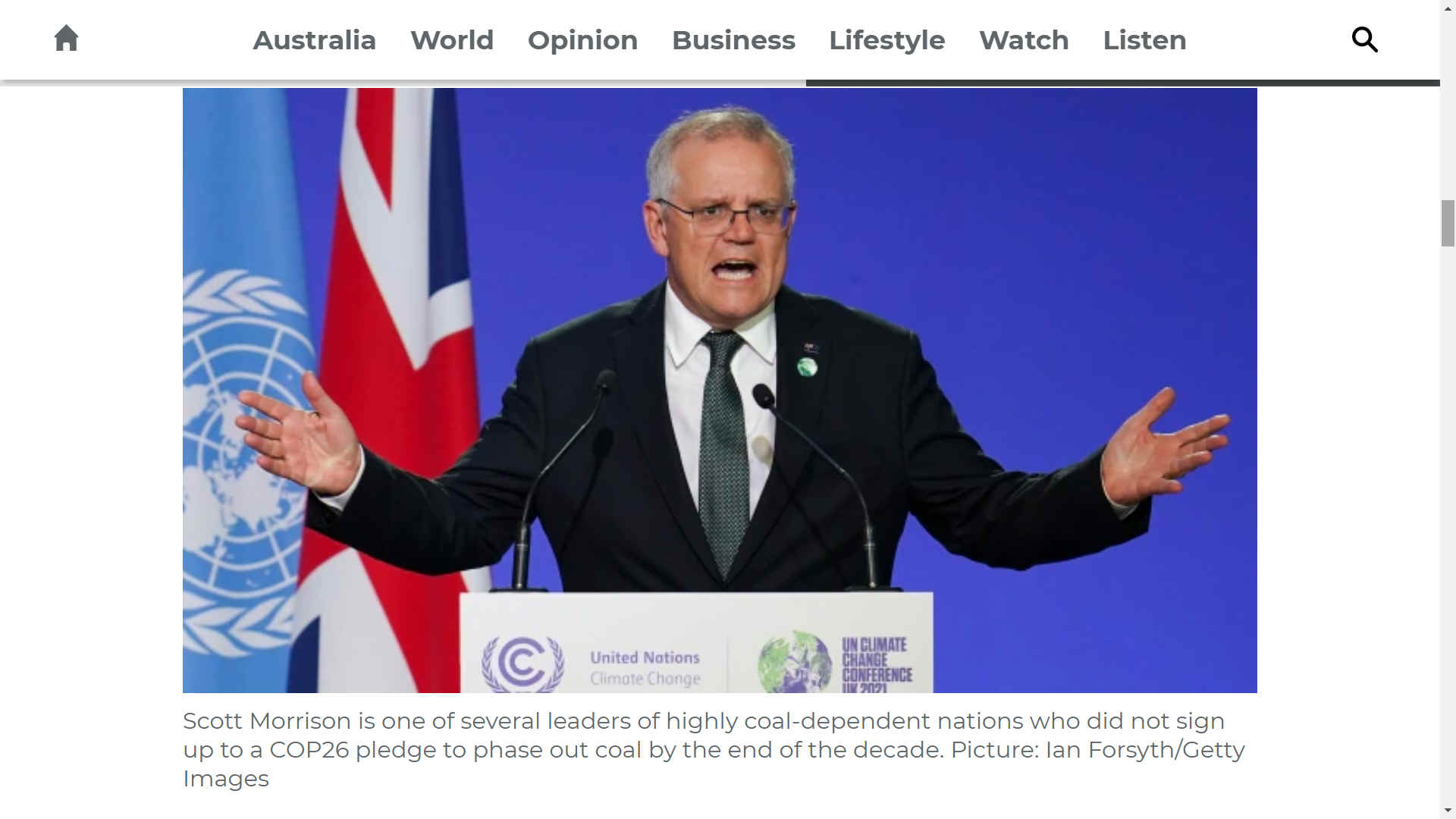
KANGAROO
HOP OUT 26 POLITICS - A climate ostrich, burying his head in the sand,
and his hand in the wallets of coal exporters, aiming for
growth, when climate cooling calls for restraint and better
management. One wonders at
the motivation of a man who knows coal is killing people all
over the world, and creating havoc with forest
and bush
fires? Has anyone taken a look at his bank balance and
declarations as to conflicts of interest? Corruption and lack of
transparency is one of the main causes of global warming. The UN
should adapt anti-terrorist tracking software, to monitor
politicians all over the world. We need a multi-agency approach
to catch climate criminals, and bring them to justice.
"When Scott Morrison tried to explain what he was going to do between now and 2030, it was just a whole series of words," UK Climate Change Committee chair Lord Deben told ABC radio.
"You cannot go forward without signing up to eliminating coal.
"What was so disappointing for us was the way it appeared that your prime minister really doesn't understand the urgency of what we have to do."
Lord Deben warned other nations would be less willing to trade with Australia unless it committed to more ambitious climate standards.
"Already, the British-Australian trade deal is under huge pressure in this country because we don't see why we should import things from Australia unless Australia meets the same standards," he said.
The
Australian
prime minister, Scott Morrison, is presumably, Australia's chief
undertaker. A grave situation, he could be described as the
purveyor or procurer of death via air pollution. But he also,
provides jobs to hospitals, medical staff and doctors, who are
needed to care for the sick before their delivery to funeral
homes, for a final service. So every smog has a silver lining.
Countries
that thumb their noses at climate change, such as to increase
harmful pollution, might have to face criminal prosecution via
the International Criminal Court, and the tenets of the Rome
Statute of 1998. Whereby it is a criminal offence to cause hurt
to another human, from your actions or failure to act to prevent
harm.
Morrison
is charged with failing to
protect life on
earth, as crimes against humanity and our ecology. By all
media accounts, he's a bit of a bounder and a cad, not caring in the
slightest about carcinogens and health care costs, by remaining
a climate denier
and doing nothing, just sitting on the fence, save for seeking
to align his reputation with giving a fig using nothing but
words. Reference; the sudden 'U' turn on electric
vehicles, as
he nears re-election time, gearing up for some blah,
blah, blah, greenwashing.
But
Australians cannot buy EVs, because Mr Scott has failed to
address the infrastructure problem to date, so blinded is he by
coal dust. He may want to clean his glasses, before voters see
right through his political agenda. The do nothing policy has
been a feature of Aussie politics since at least 1996, as you
can see from the redacted letter exhibited on this page. In 1996
Australia was no different to California
and the UK, as to instantly refuel-able EVs. That patent
lapsed. But an improvement patent could be filed to include
hydrogen and load levelling infrastructure for the 600,000 or
more service stations around the world that need upgrading,
should there be sufficient international support for affordable
replacements. Otherwise, we hope innovators and entrepreneurs
take note that they should not waste time developing solutions,
to risk bankruptcy, where policy makers blow like a candle in
the wind, not having invested anything themselves. And time is
money. Even weekend time. Hence, we need politicians committed
to cleaning up, who may be relied on, with statute to give
technology champions confidence. We don't need political
chameleons who only jump when it is voting time. We also need a
change in patent law, to support green
patents and inventors, who otherwise will be discouraged for
spending a lifetime on technology that protection is not
available for, when it finally comes of age.
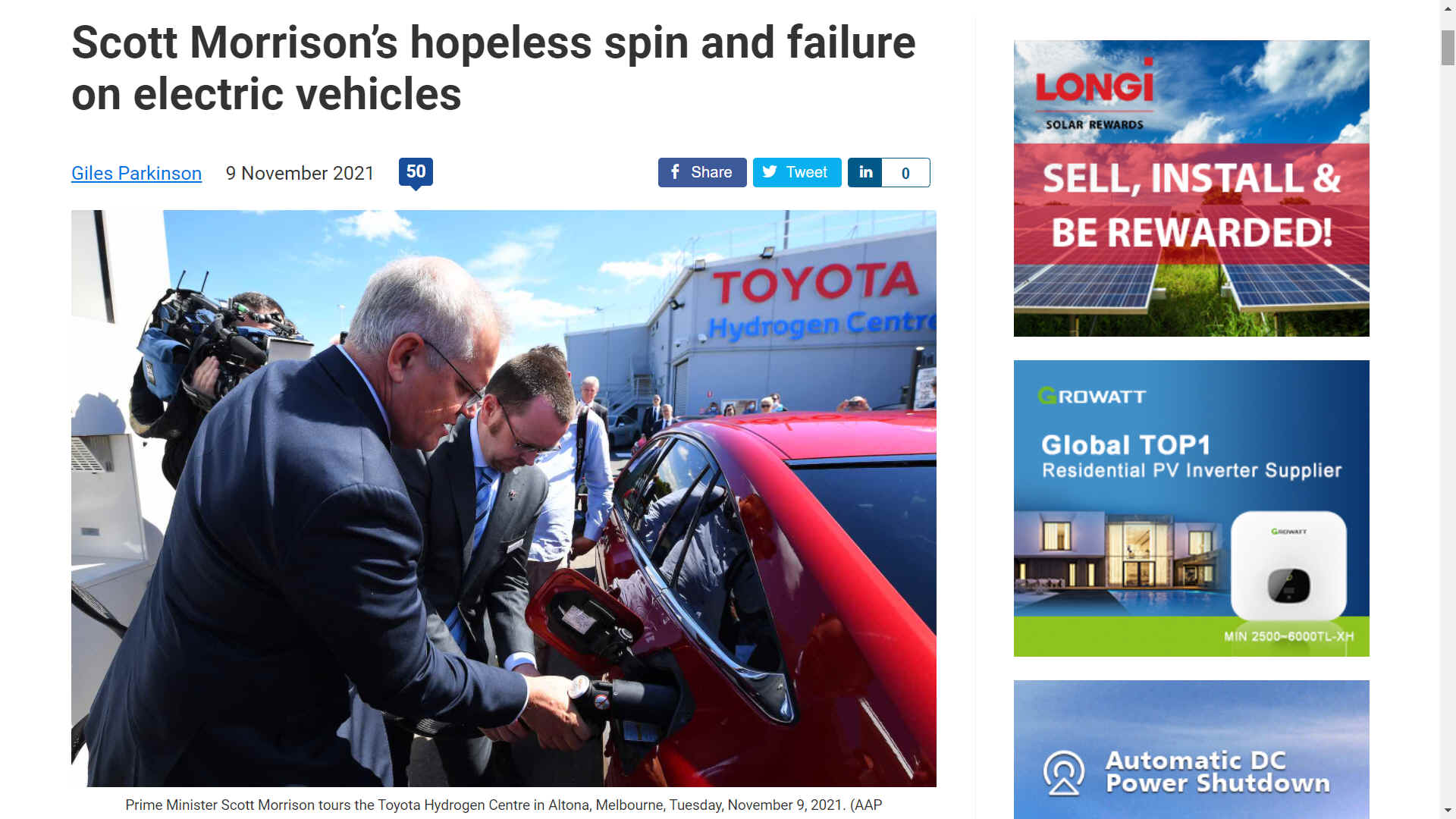
RENEW ECONOMY.COM 9 NOVEMBER 2021
- Scott Morrison’s hopeless spin and failure on electric vehicles
There was a question raised during his recent visit to the Glasgow climate conference about whether prime minister Scott Morrison actually understood the issue around climate change. People wondered why, if he says he accepts the science of climate change, does he do virtually nothing to cut Australia’s emissions.
The same question can be asked about Morrison’s understanding of new technologies. He waved a lump of coal around parliament, dismissed renewables because he wanted to focus on “fair dinkum” power, mocked battery storage, and claimed electric vehicles would ruin the weekend.
Clearly, he and his minders, and the energy and emissions reduction minister Angus Taylor, still don’t get it.
“Australians love their family sedan, farmers rely on their trusted ute and our economy counts on trucks and trains to deliver goods from coast to coast,” he said in a statement on Wednesday accompanying what is laughingly called the country’s Future Fuels Strategy, or FFS for short.
“We will not be forcing Australians out of the car they want to drive or penalising those who can least afford it through bans or taxes. Instead, the Strategy will work to drive down the cost of low and zero emission vehicles, and enhance consumer choice.”
Morrison and his team haven’t caught up with recent trends. Australians have moved on from their family sedan and have migrated to big, heavy, highly polluting SUVs. They are desperate to shift to EVs, if only they had the range of models to choose from.
The people who are being penalised the most by the country’s inaction are those who have no choice but to buy the dirty and inefficient
internal combustion engine cars that land on these shores because of the complete lack of vehicle or fuel standards.
Australia is not about to change that. It remains virtually the only western economy to allow the dirtiest fuel and the dirtiest engines on to its roads, at huge cost to health, and to consumers, who pay an average $600 more in fuel than they should do because of the dirty and inefficient fuels and engines.
The government reckons the electric vehicles will make up just 30 per cent of total new car sales by 2030. But again, it’s kidding itself. Exactly what sort of cars do they expect Australians to buy in 10 years time?
The choice of petrol and diesel cars will be vastly reduced. Most major brands will have already stopped making fossil fuel cars altogether by then, because most major countries will have banned such sales.
Morrison says the government is focusing on supporting fleets to adopt EVs. That is actually smart and was the centrepiece of the Labor EV policy the Coalition derided at the last election. Labor realised EVs already make financial sense for fleet owners, and that will create a much needed second hand EV market.
But Morrison should start with the government’s own fleet, both the Commcar fleet and the cars that MPs are allowed to choose as part of their packages.
Bill Shorten, as we reported in The Driven, our EV-focused sister site, was the first federal MP to get an EV under this scheme, but he had to move heaven and earth to do so. It shouldn’t be so hard, and Shorten says it is clear he will be saving money because the running costs are so low.
The Commcar fleet has just two EVs in its fleet. State government fleets have promised to move to full electric by 2030, including in the ACT, NSW and Victoria.
The most striking part of the federal “plan” is the lack of any incentives to purchase EVs. Morrison is convinced that this puts it on a par with rooftop solar.
“Just as Australians have taken their own decision to embrace roof-top solar at the highest rate in the world, when new vehicle technologies are cost competitive Australians will embrace them too,” he spinned.
This comment makes absolutely no sense.
Yes, rooftop solar is cost competitive, very much so, but it has been generously supported by federal rebates and continues to be. That has delivered widespread benefits, both in decarbonising the grid, bringing down the overall cost of electricity, and pushing dirty coal out the back door.
But it didn’t happen without federal government support. Some argue that should be wound back now and any support directed to lower income households, but any realistic assessment of the EV industry shows that initial support packages are crucial.
And that’s the big problem with the Coalition government’s thinking about climate, energy and transport. It’s dancing around the issues, for fears of upsetting powerful lobby groups, the fossil fuel sector, and industry incumbents.
It could help accelerate the transition to a decarbonised grid by 2035 – because the Australian Energy Market Operator, whose job is to keep the lights on – actually has a real plan to do that.
It could support the transition to an electrified fleet, because it would not just cut emissions, improve health outcomes, and save money, and it would also help eliminate a $20 billion import fuel bill and the strategic issues that go around that.
Instead, it appears to be in thrall of technologies that don’t yet exist – like carbon capture and storage, hydrogen cars, and small modular reactors – because for some reason it doesn’t like the one that are present now, but threaten to massively disrupt the business models of big industry.
And in the meantime, its policies, such as they are, just keep spinning. Morrison is even trying to pretend he didn’t oppose EVs in the last election.
Remember this? “I mean if you have an electric car and you live in an apartment, are you going to run the extension cord down from your fourth floor window?”
Morrison says there has, since then, been a massive change in technology in the intervening years. They’ll even tow the boat, and the caravan. But that doesn’t stop Morrison for hanging on to technologies that are not quite there.
The FFS was launched at a hydrogen refuelling centre operated by
Toyota, a huge multi-national that has been one of the most vociferous opponents against vehicle and fuel emissions standards, both here and overseas. Some times the government doesn’t even know how to pretend it cares.
By Giles Parkinson
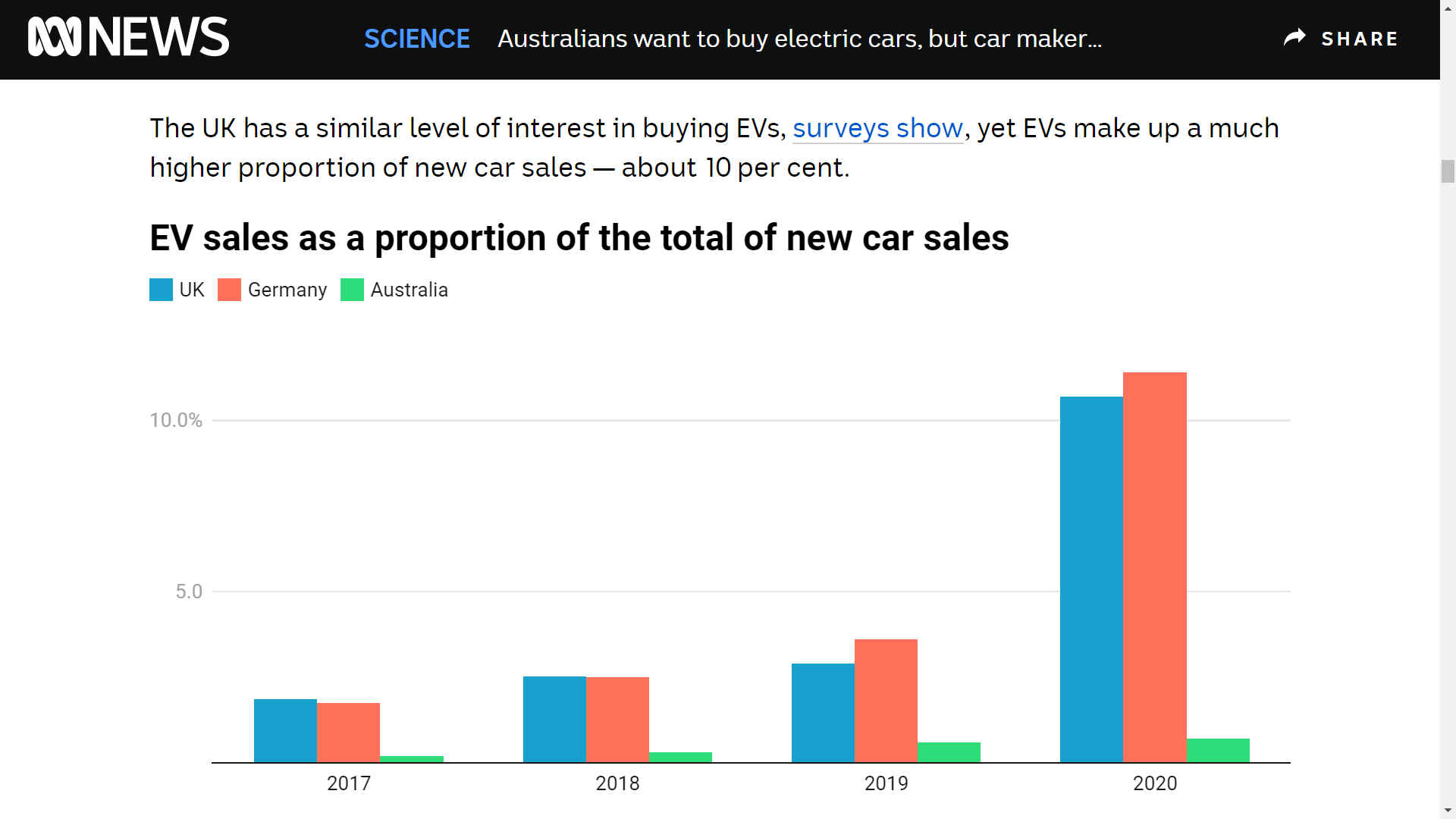
ABC NEWS APRIL 2021
- Australians want to buy electric cars, but car makers say government policy blocks supply
Surveys show Australians want to buy electric vehicles (EVs), but they continue to languish at less than 1 per cent of new car sales. What's going on?
The answer is complex and takes us down a twisting path of carbon targets, "super credits" and other matters that people outside the auto industry generally don't pay much attention to.
At the end of this path, however, is an obvious fact: EVs that sell well in Europe, the US and UK are simply not available in Australia.
Volkswagen, which is on track to become the world's largest EV maker, sold 212,000 EVs worldwide in 2020.
Not one of those was in Australia.
The top-selling electric car in Europe in 2020, the Volkswagen ID.3, won't be launched in Australia until at least 2023, its maker says.
Car makers have begun skipping Australia when releasing their latest models and some are publicly saying the country is becoming a "Third World dumping ground" for outdated petrol-engine technology.
Meanwhile, 75 per cent of new car sales by 2030 need to be electric for Australia to achieve net zero emissions by 2035, according to the latest report by the Climate Council.
So why are EV car makers skipping Australia, and what else is behind low EV sales?
AUSTRALIANS ARE INTERESTED IN EVs … BUT AREN'T BUYING THEM
Consumer interest in EVs isn't a recent phenomenon. It's been high for years.
Since 2018, the proportion of Australians who would consider buying an electric vehicle as their next car has stayed at about 50 per cent, according to annual surveys commissioned by the Electric Vehicle Council.
This interest isn't translating into more EVs on the roads, though, with only 6,900 sold in Australia in 2020. This works out to about 0.7 per cent of new car sales.
The UK has a similar level of interest in buying EVs, surveys show, yet EVs make up a much higher proportion of new car sales — about 10 per cent.
Some of this demand is being soaked up by hybrids, which have both petrol engines and electric motors.
Almost twice as many hybrids were sold in 2020 as in the previous year — a growth in sales Australian Automotive Dealers Association (AADA) chief executive officer James Voortman described as "insane".
"We are seeing changing attitudes towards low emissions cars," Mr Voortman said.
But in other markets hybrids have been selling well alongside EVs. In Australia, hybrids are out-selling EVs 10 to one.
What makes the situation even more puzzling is that Australia has the highest per-capita uptake of rooftop solar in the world.
Studies show people who invest in rooftop solar are more likely to buy an EV, said Ezra Beeman, managing director of Energeia, a consulting firm that has modelled Australia's electric vehicle market for government agencies.
"You'd think the number-one market for rooftop solar PV would be good for EVs as well," he said.
Instead, Australia has the lowest rate of electric car ownership among developed countries.
Something has put the handbrake on EV car sales, said Scott Nargar, a senior executive at Hyundai Australia.
He said Hyundai's own research consistently showed intent to buy an EV within the next five years was "very, very high".
"It's much higher than 50 per cent. There's a great market there," he said.
"But there is something that's holding back Australia."
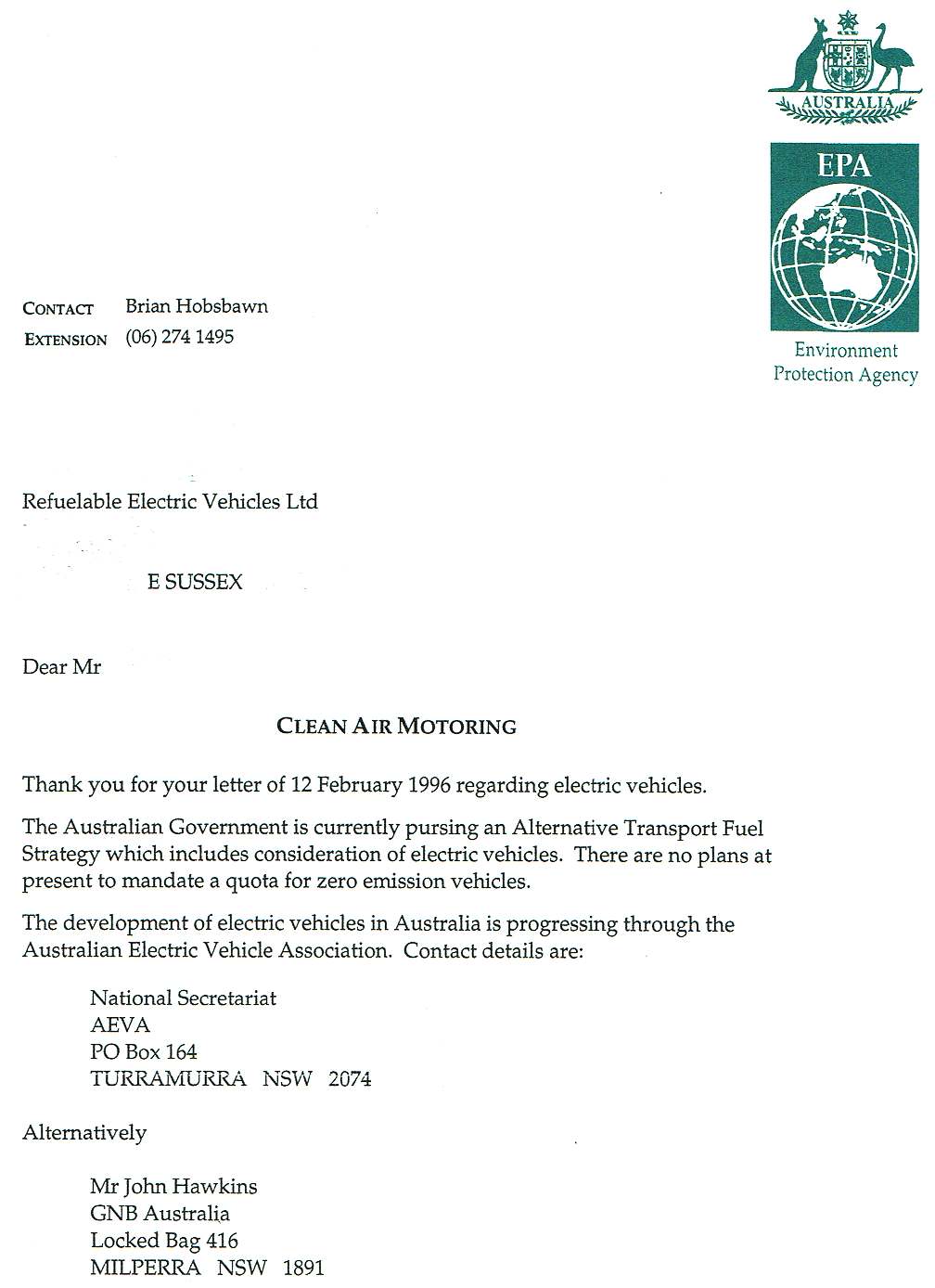
SO WHY DIDN'T VOLKSWAGEN SELL A SINGLE EV IN AUSTRALIA IN 2020?
Because there were none for sale.
Volkswagen didn't ship any EVs to Australia in 2020, despite many Australians asking to buy them, said Michael Bartsch, general manager of Volkswagen Group Australia.
"There isn't a day go by where we're not answering a query on when we'll be able to supply an electric vehicle in Australia," he said.
So why not meet this demand?
Because his global head office, located in Germany, won't agree to it, Mr Bartsch said.
"Australia has some of the most lax environmental standards in the world.
"We are a Third World dumping ground in terms of automotive technology.
"We'll put those cars where we get the biggest commercial advantage, and the biggest commercial advantage of the moment, when you overlay the fines for not achieving the CO2 targets, is Europe."
EACH EV SALE IS THOUSANDS OF DOLLARS IN 'SUPER CREDITS'
We need to dive into a fairly dry topic: EU carbon targets.
The EU has mandatory carbon targets for car makers that are enforced with hefty fines.
Car makers are fined according to the average emissions of all the cars they sell in Europe over the course of the year.
The fine is about $150 for each gram of CO2 per kilometre beyond a nominated target.
The EU's current target is 95 grams of CO2 per kilometre.
A Volkswagen Golf, for example, produces about 120 grams of CO2 per kilometre.
This means that every time Volkswagen sells a Golf in the EU, the company effectively faces a fine of thousands of dollars (though in practice the fine is calculated according to the average emissions of all the cars sold in the year).
But car makers can offset the emissions of their CO2 emitting cars with the "super credits" they gain by selling EVs (which are deemed to emit nothing).
Each EV sale in Europe therefore represents thousands of dollars worth of these carbon credits. In 2020, Volkswagen missed its CO2 targets by a few grams per kilometre and now faces fines of more than $150 million.
Jake Whitehead, a transport expert at the University of Queensland, said it was hard to estimate the value of the credits of each EV sold in the EU, but it could be something in the order of $26,000 per EV.
No wonder Volkswagen won't send any EVs to Australia.
THIS IS CAUSING A SHORTAGE OF AFFORDABLE MODELS
Carbon targets in the EU translates to fewer affordable EVs available for purchase in Australia.
About half of the EVs sold in Australia in 2020 were Teslas, which at the time cost from $73,000 to $144,000 — well outside the "affordable" category.
"If somebody in Australia could buy a really good electric vehicle for $52,000 or thereabouts, which is completely doable, then you open up a completely different [segment] of the Australian market," Mr Bartsch said.
"Most of the intelligence says that an average person would pay a 10 per cent premium for an electric version of an equivalent [petrol] vehicle."
But EVs in this "affordable" price range are in very short supply in Australia.
According to the Electric Vehicle Council, Australia has many fewer EVs in the $30,000 to $60,000 range than other markets.
"If we look at the UK, they've got some 32 models available in that range — we have about four," council chief executive officer Behyad Jafari said.
"And even those are only bought here in very low allocations."
SUPPLY IS THE MAIN REASON PEOPLE AREN'T BUYING EVS - NOT DEMAND
The number one issue is supply, Mr Whitehead confirmed.
"If there’s not a vehicle to sell, it doesn't matter how much demand there is."
In fact, the number of models that are made available directly correlates to the uptake of EVs, according to modelling conducted by Energeia for the Australian Energy Market Operator (AEMO) in 2016.
"Model availability is as important as anything else," Mr Beeman said.
"Even if EVs were all the same price, people want to be able to drive the car they like."
And to make matters worse, EVs are generally much more expensive than their petrol-powered equivalents.
One of the cheapest EVs in Australia, the Hyundai Ioniq Electric Elite, retails for $48,970.
The equivalent petrol car, the Hyundai i30 Elite, is priced at about $30,790.
Hyundai sold 526 Ioniqs in 2020, but more than 20,000 i30s.
Other developed countries such as the US, France, Germany and Canada offer generous financial incentives and tax breaks worth about $10,000 to close that price gap and make EVs a more affordable option.
In Australia, stamp duty concessions in the ACT and Queensland, and registration discounts in ACT and Victoria, work out to less than $1,000.
There are no national incentives directly aimed at making EVs more affordable.
However, Victoria has done the opposite. It's set to introduce a per-kilometre road tax on EVs from July 1.
WHAT CAN BE DONE TO IMPROVE SUPPLY ?
Volkswagen says it will ship EVs to Australia if the government introduces EU-style mandatory carbon targets backed up with fines.
This would solve the supply shortage by giving car makers a greater financial incentive to ship EVs to Australia, Mr Bartsch said.
"Where you have no legislative imperative, that is always going to be the last place you send the vehicles."
In February, the federal government released a discussion paper with ideas to support the shift to electric vehicles, including investing in charging infrastructure and adding electric cars to the COMCAR fleet.
Carbon targets, also known as fuel efficiency standards, were not on the list.
A spokesperson for the Minister for Energy and Emissions Reduction, Angus Taylor, said the government would "not be lectured about vehicle emissions by a car manufacturer that has a track record of deceiving motorists and violating clean-air laws".
In 2015, Volkswagen admitted to rigging around 11 million diesel vehicles with software that enabled them to pass emissions tests.
"Volkswagen has shown its concern for the environment is meaningless," Mr Taylor's spokesperson said.
But other car makers voiced similar concerns to Volkswagen's.
Nissan Australia managing director Stephen Lester said he also supported mandated CO2 reduction targets for all vehicles.
"Clear and consistent direction from governments is a critical signal to car makers to prioritise the importation of the latest low and zero-emissions vehicles for Australian consumers," he said.
Hyundai Australia's Scott Nargar said other manufacturers — though not Hyundai — were pausing shipping cars to Australia.
"Other manufacturers are just holding off because they don't know what the government's doing," he said.
"It's impacting people's decision to bring vehicles here."
The Electric Vehicle Council's Mr Jafari said CO2 targets would help, along with financial incentives for EV buyers and better charging infrastructure.
"Eighty per cent of the new vehicle sales market around the world has … CO2 standards, and Australia doesn't," he said.
"The United States first implemented those back in 1976.
"Not having CO2 standards in 2021 is like not having roads built.
"We get the dregs — we get the cars that can't be sold in those other markets."
THE GUARDIAN 9 NOVEMBER 2021
In a galling pivot, Scott Morrison hopes he can peek under the bonnet of an EV and be accepted as a convert.
It’s hard to say which element of Scott Morrison’s new electric vehicle strategy is most galling.
If you missed the unveiling on Tuesday, there’s not much to catch up on, given the strategy has all the substance of a Corn Thin.
The Coalition’s “strategy” for electric vehicle take-up contains $178m of government spending on EV infrastructure but no new policies, just like its “Australian Way” plan to achieve net
zero emissions by 2050.
It rebuffs calls for vehicle emissions standards and provides no market signal to incentivise take-up – the two measures viewed by experts as the most important to drive change.
But while a policy document three years in the making that is entirely bereft of substance is certainly offensive, it is nowhere near as galling as the way in which Morrison expects voters to forgive and forget the Coalition’s position on
electric vehicles ahead of the 2019 election.
For those who need a reminder, Morrison shamelessly claimed that Labor’s policy, which set a target of half of all new cars to be electric by 2030, would “end the weekend” and lead to apartment dwellers dangling extension cords out of their windows.
[Out of touch or what]
“It’s not going to tow your trailer. It’s not going to tow your
boat. It’s not going to get you out to your favourite camping spot with your family,” Morrison said at the time.
A hyperbolic Michaelia Cash, then the small business minister, pledged to “stand by our tradies and … save their utes” from Bill Shorten’s grasp.
The rhetorical absurdity was backed up by Liberal party advertising on Facebook that claimed “Labor’s car tax” would hike up the price of Australia’s favourite cars.
On Tuesday, when Morrison was asked by journalists how he could “honestly spruik
electric
vehicles” after campaigning against them so vigorously at the last election, he suggested this very obvious statement of fact was a “Labor lie”.
“But I didn’t. That is just a Labor lie. I was against Bill Shorten’s mandate policy, trying to tell people what to do with their lives, what cars they were supposed to drive and where they could drive,” Morrison said, lying about his lie with another lie.
Related: Toyota announces the bZ4X: the carmaker’s first mass-produced
electric vehicle
When presented with remarks he made on 2GB radio about having to “run the extension cord down from your fourth floor window” to charge a car, Morrison claimed his position had changed in line with the “massive change in the technology over the last few years”.
The prime minister’s chutzpah knows no bounds.
In a warm-up act for the election campaign, Morrison has been on the ground this week arguing for “choices, not mandates” and “technology not taxes”, saying Labor has a plan to force Australians to do things they don’t want to do.
“I don’t have to tell them to get rid of the car they’ve got now. That’s what Labor wants to do. I’m not going to put up the price of
petrol on families and make them go and buy
electric
vehicles,” he said.
“We’re not going to tell them what to buy. We’re not going to tell them where to drive or where they can’t drive.”
Ah, no. And nor will Labor.
Quite a feat, really, to launch a scare campaign on Labor policies that don’t exist yet.
After telling voters that government support for electric vehicles would upend their very way of life, Morrison is now hoping that he can peer under the bonnet of one and be accepted as a genuine convert.
Related: Scott Morrison’s approval rating at lowest point since aftermath of black summer bushfires
It forms part of a broader pivot on climate change policy that seeks to erase from the collective consciousness a decade of Coalition fear-mongering on the emissions reduction task that the Liberal and National parties have unapologetically and repeatedly used for political gain.
Morrison is cynically relying on a disengaged electorate to try to get away with the conversion, as the government – or more accurately, the government pollsters – acknowledge that the jig is up.
After a decade of inaction and denial on climate change policy, there is much catching up to do to put Australia on the path to achieving carbon neutrality.
But as with Morrison’s net zero commitment, his EV strategy appears nothing more than a box-ticking exercise for a policy area that most Coalition MPs wish would go away.
Heaven forbid that Morrison’s political conversion on climate policy would actually translate to doing something about it.
Doing nothing, remember, is the Australian way Morrison prefers.
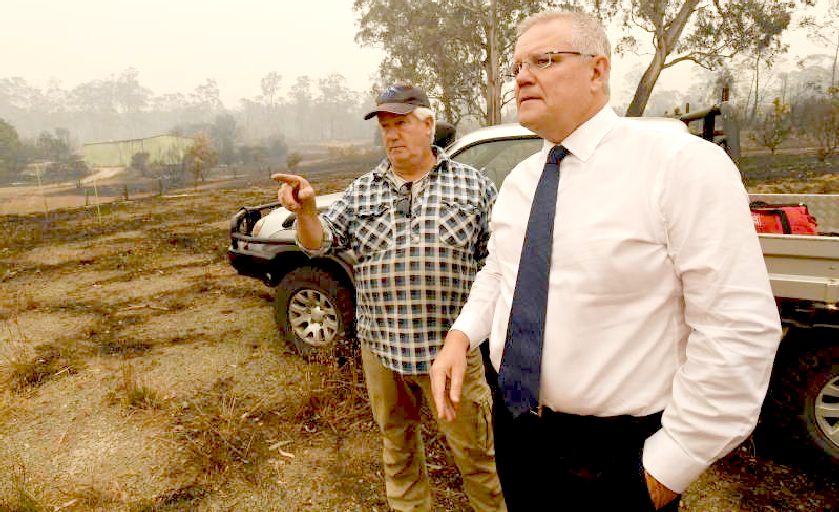
THE
ASHES - CBS NEWS 3 JANUARY 2020 - Australian wildfires may have killed half a billion animals and plants
As apocalyptic wildfires continue to rage across Australia, the loss of life in the region is reaching staggering numbers. Ecologists at the University of Sydney now estimate that nearly half a billion animals and plants have been wiped out since the fires began several months ago.
The "mega blaze" has destroyed homes and sent thousands of people fleeing to the shoreline from New South Wales and Victoria. About 12.35 million acres of land have burned nationwide over the past few months. At least 17 people have been killed, The Associated Press reports.
OPINION POLL - THE GUARDIAN 8 NOVEMBER 2021
Scott Morrison wants to be Australia’s Prime Marketer – but voters aren’t buying his woeful climate rebrand
The PM has sent the clear message there is no ‘us’ in Team Australia’s climate approach, only ‘me’
Australia’s Prime Marketer has returned from the international launch of this new The Australian Way brand and, much like his previous forays on to the world stage, it has been a polarising affair.
In a brazen reimagining of his “Cool Coal” range, the PM has raised the middle finger to a gathering meant to be about global cooperation by sending the clear message there is no “us” in Team Australia’s climate approach, only “me”.
The Australian Way recycles old commitments into a new shiny brochure of vendor-generated graphs and talking points while refusing to set 2030 climate reduction targets, undermining tougher restrictions on coal and efforts to reduce methane emissions.
The Australian Way is to do the bare minimum that one can get away with, take credit for the work of others and declare “she’ll be right”. It is to kick wicked problems down the road, because the next generation needs to have something to worry about too.
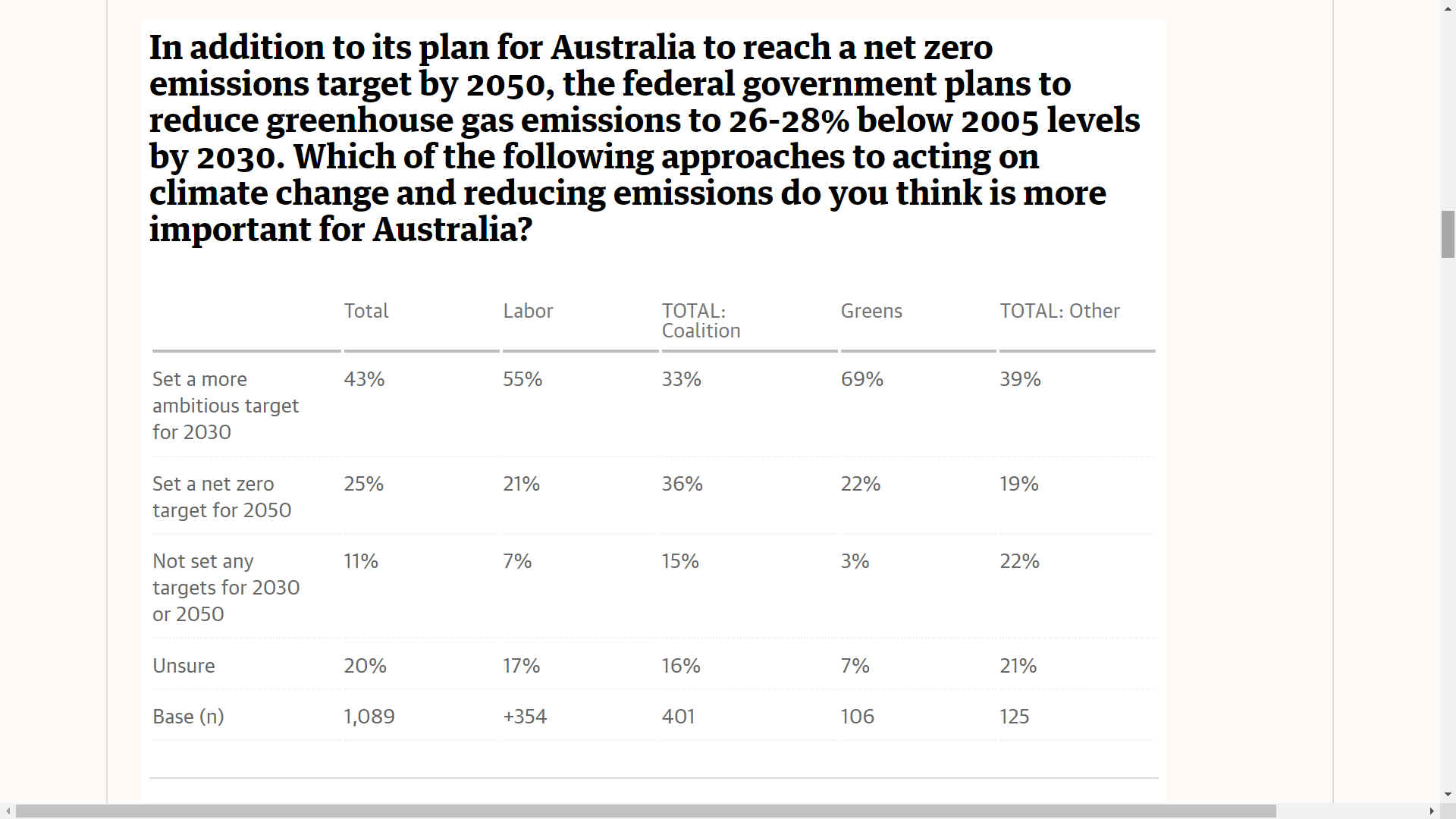
Early indications are that the Australian Way is struggling to cut through to its key segment, Coalition voters trapped between the denial of its rural outposts and the desire for even a modicum of meaningful action from its city base.
You can see how the rebrand was designed to shift the PM’s market position. From being caught in a binary of action/inaction, the Australian Way is positioned at the centre of a spectrum where the PM can attack opponents on the left as
economy wreckers while placating those who want an end to inaction.
But a hill constructed on just 25% of the electorate is not one that is large enough to fight from, let alone die on; and when only just over a third of Coalition voters are on the team, with similar numbers wanting to see something more ambitious, it begins – exposed on all fronts.
But as we have seen over the past week, the Australian Way is about more than simply dodging accountability on climate action; it reflects a broader engagement strategy with the world.
The PM has shown how the Australian Way is to play friends off against each other, lurching into complex relationships like a drunk on a bender, upending tables and demanding someone buy you your next drink.
The Australian Way is to rat on your mates when you have a blue. It’s about deflecting blame when you get called out, using others as a
human shield when the heat is really on rather than taking responsibility yourself.
The PM’s awkward performance at the global forums may have been jarring to global leaders but they are not his target audience. We are. Judging from the results in a separate question, we are less than inspired by his performance.
These are less than resounding reviews. Even a sizeable chunk of Coalition voters see the PM’s new work as undermining our international reputation, which in another question three quarters of us say is something we, as a middle-sized power, should value highly.
While these global missteps will not determine next year’s election, the sober reality is that the PM returns with his lowest approval ratings since the 2020
bushfires having burnt through any brand equity built up through the pandemic.
Australia’s uncomfortable engagement with the world has always vacillated between a cloying neediness (asking visiting celebrities “what do you think of Australia?” as they disembarked from the plane) to a bumptious exceptionalism (“the best Olympics ever!”).
This contradiction has become more pronounced over the pandemic. We have isolated for our own protection more successfully than most, while relying on global scientific cooperation to deliver the vaccine that will allow us to live with this ongoing threat.
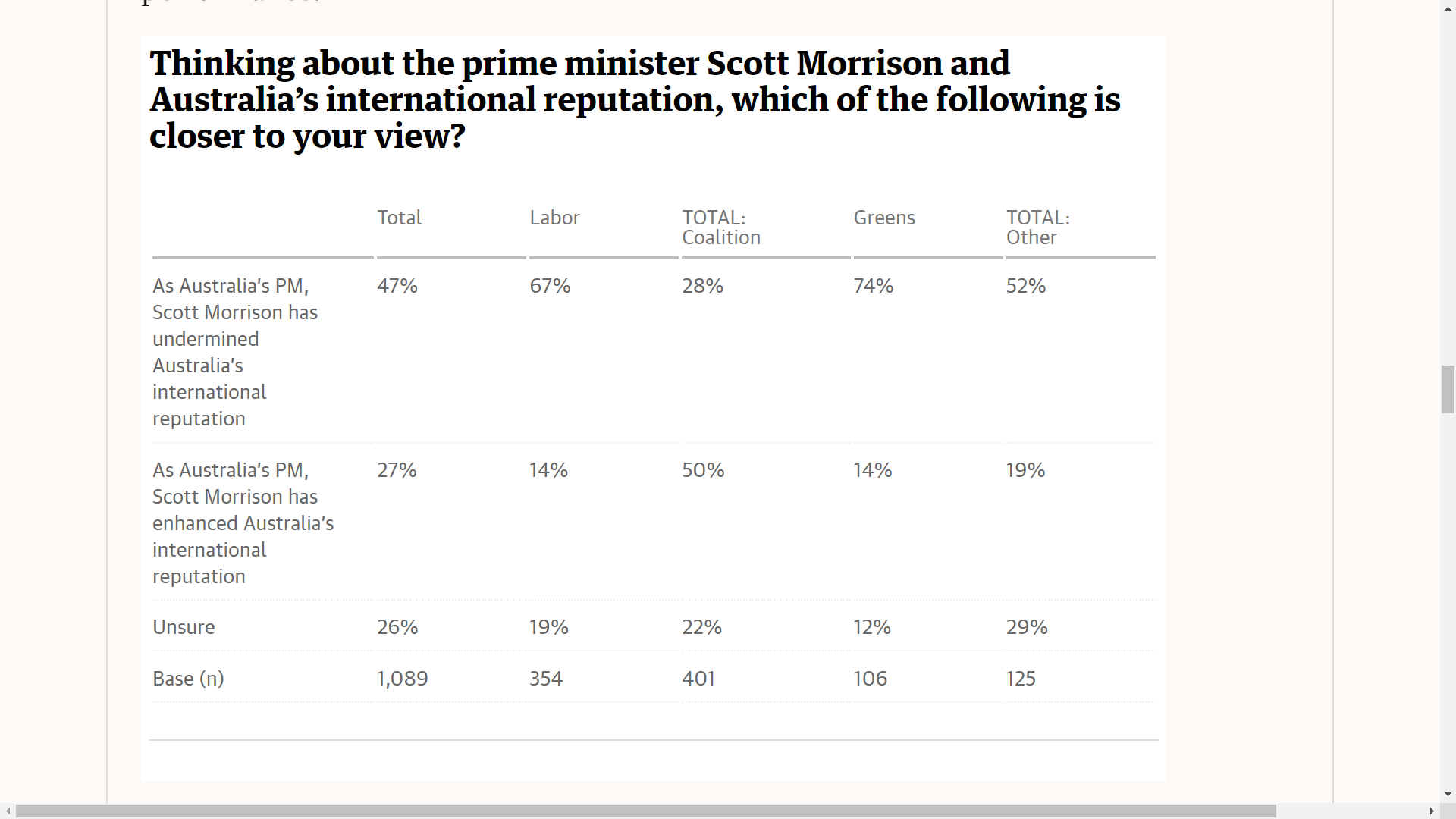
But this is not the PM’s Way. For a start it leaves no one to blame if things go awry. Worse still it would require concrete action on our part as a member of that collective effort.
Rather his Australian Way is not to look too closely at these contradictions, or indeed anything at all; from “Boats” to “Death Taxes” to “ScoMo” it may not bear scrutiny but if it looks good out of the corner of a distracted eye then it will do.
As Sean Kelly writes in his excellent new book, The Game, this has been this PM’s modus operandi all the way back to his time with Tourism Australia: spending $180m for an advertising campaign that reduced the nation to series of compelling but disjointed visual cliches.
In a similar way Kelly argues the PM has constructed himself as a “flat character”, a two-dimensional figure who cooks curries on Sundays for Jen and the girls and loves the
Sharks and is “authentic”, provided you don’t look too closely.
Now he is endeavouring to do the same thing with the nation he leads, giving the impression of movement on climate and embracing the promise of untested technologies while refusing to actually do anything different.
Ultimately that’s what the PM’s wants us all to do: embrace the slogans at face value so we can all feel good about ourselves without having to change anything, least of all our government.
After all, isn’t that the Australian Way? Aussie, Aussie, Aussie?
Oi! Oi! Oi!
WTF? -
How did this guy get elected as Prime Minister. He can't add up.
Everyone knows that coal is not sustainable, but Scott Morrison
used 'coal' and 'sustainable' in the same sentence. Any economy
built on fossil fuels is not sustainable Mr Scott. It is heading
for collapse, even though you may be benefiting personally in
the short term, by being popular with the coal
lobbies. Nor is
your aversion to zero emission (electric) vehicles sound. You
might want to think about that, as you condemn hundreds of
thousands of Australian children and adult voters to a painful
death from lung cancer and heart disease, as a result of
Australia sitting on the fence - taking advantage of the efforts
of other nations to reduce their CO2 and other greenhouse gases,
while your inaction causes harm to overseas citizens. We are
reminded that Australia was founded by penal colonies, with
British subjects deliberately committing crimes to be shipped to
the then colony down under, for a new start in life. And now
look at you!
SKY
5 NOVEMBER 2021
Australia has refused to join nearly 200 countries and organisations in pledging to phase out coal power by the end of the decade despite the country's high dependency on fossil fuels to power the nation.
The commitment was made at the COP26 climate summit in Glasgow with 190 countries signing the Global Goal to Clean Power Transition Statement which will see them end investment in new coal power generation both domestically and overseas.
Signatories will also rapidly scale up deployment of clean power generation and for major economies, phase out coal power by the 2030s, while remaining nations will have until the 2040s.
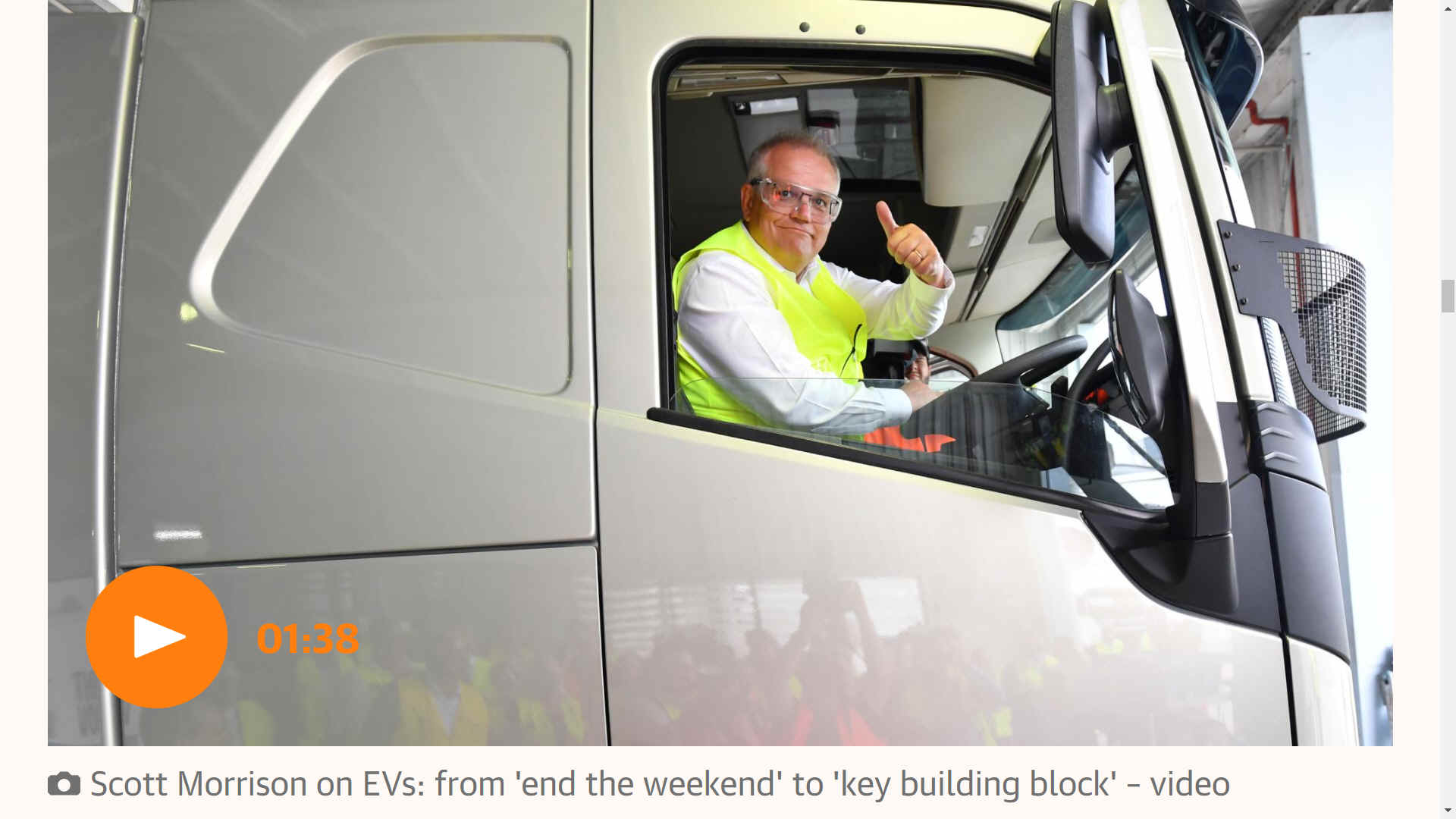
HYPOCRITE -
He only says and does what is needed to get re-elected and
remain in office. With so much desert, why is Australia not
investing in solar farms to produce green
hydrogen? There is your future export, for the next prime
minister to capitalize on. Without any definitive plan to phase
coal out, Mr Morrison can keep kicking the ball down the road to
suit his investors. All the while damaging other countries
health and prosperity. I'm alright Jack!
Prime Minister Scott Morrison, however, withheld his signature, making Australia one of several highly coal-dependent nations who did not commit to the pledge - along with
China, the world’s biggest greenhouse gas emitter, India and the United States.
It comes as the Grattan Institute this week warned Australia would struggle to meet its net zero emissions by 2050 target unless it replaced certain exports such as coal and liquified natural gas.
In 2020, fossil fuels contributed to 76 per cent of Australia’s total
energy generation, including coal (54 per cent), gas (20 per cent) and oil (two per cent).
The Grattan Institute urged the federal government to take action now to “create momentum and to avoid locking in emissions for decades to come”.
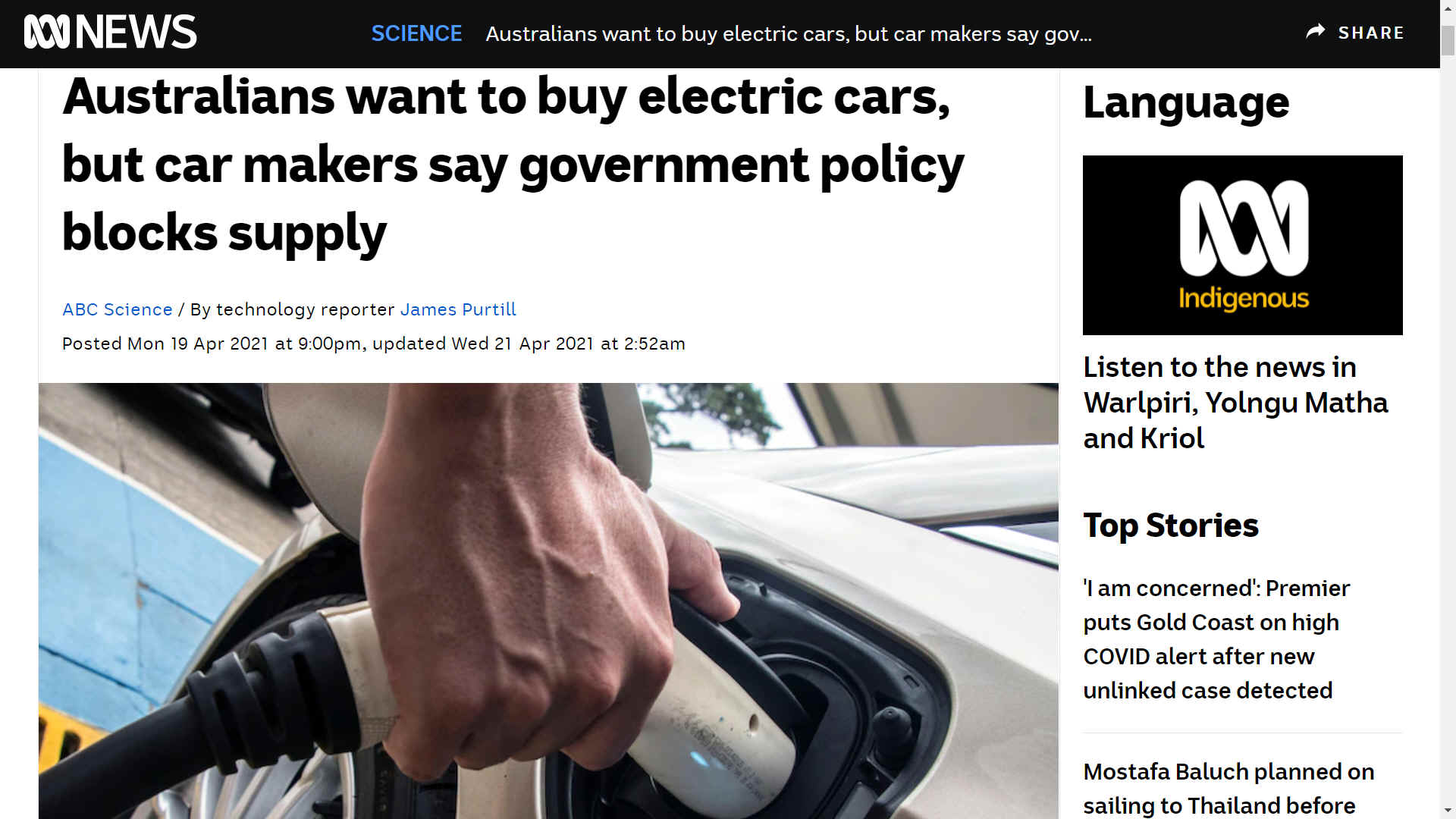
“If we start now and play smart, we can use our vast resources of minerals and
renewable energy to more than replace the export revenues - and jobs - that we currently get from fossil fuels.”
Speaking to the Global Cola to Clean power Transition Statement, UK Business and Energy Secretary
Kwasi Kwarteng touted it as a “milestone moment in our global efforts to tackle climate change as nations come from all corners of the world unite in Glasgow to declare that coal has no part to play in our future power generation”.
He further declared the agreement of nearly 200 nations demonstrated the “end of coal is in sight”.
“The world is moving in the right direction, standing ready to seal coal’s fate and embrace the environmental and economic benefits of building a future that is powered by clean energy," he added.
Mr Morrison told reporters in Rome ahead of his Glasgow trip that Australia was not interested in implementing blanket bans, such as the one which would be required by agreeing to the coal agreement.
“Our policy is very clear. We are not engaged in those sorts of mandates and bans. That’s not the Australian Government’s policy, it won’t be the Australian Government’s policy,” he said. [Time
then to change to a government who gives a shit]
“All countries are coming at this task from different places, their economies are different. And as a global community, we’ve got to understand that.”
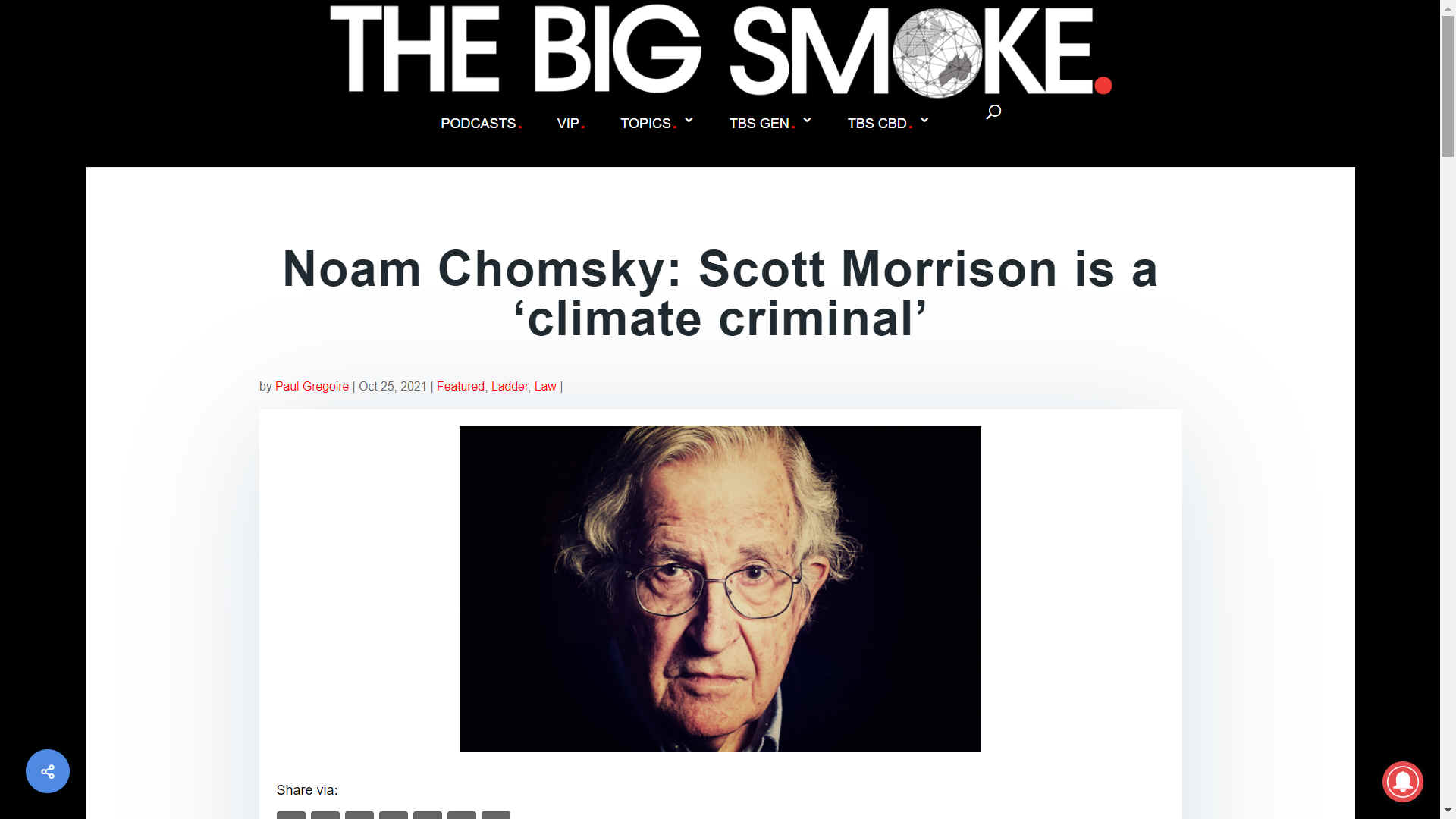
The father of modern linguists named two major threats to our existence. The first is the seven decades-long prospect of nuclear war, while the second is global warming, which the academic described as being “on its inexorable course”.
Chomsky told a crowd that humanity is fast approaching “conditions of 125,000 years ago”, when sea levels were 25 feet higher, with the consequences of this being “almost unimaginable”. And he added that under Trump, the US has become the world leader in fossil fuel production.
The main offenders
“Anyone with eyes open knows that we are now facing a potential environmental catastrophe that may literally end organized human life in any tolerable form,” Professor Chomsky said. “Most countries of the world are doing something about it, in a number of cases quite a lot.”
“There are three states that are not only refusing to join in these efforts but are acting to accelerate the crisis: the United States, which is in the lead; Bolsonaro’s Brazil, which is destroying the Amazon; and Morrison’s Australia,” he continued.
Australia is currently the world’s largest exporter of coal. In terms of emissions, coal is the most carbon-intensive fossil fuel that can be burnt. And according to the Australia Institute, per capita, Australia’s emissions – both domestic and exported – are only below a few small oil-rich nations.
An IPCC report released in late 2018 warns that emissions need to be cut by 45 percent of 2010 levels by 2030, and net-zero by 2050, in order to prevent a temperature rise above 1.5°C. This will limit the great changes already coming, as they’d be much more catastrophic at a 2°C rise.
And looking at the likely results that the current activities of the American, Brazilian and Australian governments are giving rise to, Professor Chomsky makes certain that these are criminal acts on a scale never seen before.
Crimes against life itself
Scott Morrison was wheeled in to stand before reporters as the Liberal Nationals new leader in August 2018, so as to replace outgoing PM Malcolm Turnbull, who made the political mistake of supporting a national energy plan that would have seen the nation’s emissions drop slightly.
The newly-minted prime minister was a politician that fossil fuel barons could rely on. He’s the man who, as treasurer, turned up in federal parliament in February 2017 with a lump of coal in his hand, screaming at the chamber, “This is coal. Don’t be afraid. Don’t be scared.”
Greenpeace’s 2019 Dirty Power documentary outlines that the Morrison government’s staff is stacked with representatives from the fossil fuel industry. The PM’s own office includes a chief of staff and a principal private secretary that are both former fossil fuel lobbyists.
And as the Morrison government plummeted towards an election that forecasters swore it would lose last May, it ensured that the final federal approval on the Adani mine was signed off the month prior. A move that opens up the Galilee Basin to five or six other huge coal mines.
Responses to a climate catastrophe
Although, it became apparent something had changed in August last year, as the bushfire season commenced early. It continued periodically over the coming months, as scientists began to cite climate as the cause, but this didn’t stop the PM from spruiking new laws to prevent coal boycotts.
Morrison addressed a Queensland Resource Council luncheon on 1 November, at which he announced he was drafting new laws to prevent secondary boycotts of fossil fuel projects. “We’re not interested in closing down the mining industry, but building it up,” the PM told the room.
About a week or so later, bushfires on a scale never seen before started to kick in along the eastern seaboard and continued on into early February, when the Australian parliament reconvened for the new year. More than 12.6 million hectares were lost and around a billion animals perished.
And on the third sitting day of parliament, right before the rains came to sweep away the remaining fires, the Morrison government appointed a new resources minister – one that’s just itching to heat things up a little more.
Fresh resources minister Keith Pitt appeared in the press two days after the heavens extinguished the final fires, and declared that the nation needs more coal, more gas and more uranium exports to lift standards of living – as Extinction Rebellion would say, it was “business as usual”.
For the crime of ecocide
Of course, Chomsky – one of the world’s leading public intellectuals – makes clear that Morrison’s Australia is hardly alone, as our nation’s government is only one of the three most destructive climate criminals on Earth.
The climate change-denying Trump administration began formally withdrawing from the Paris Agreement last November, while the environmentally hostile Bolsonaro government has been presiding over the destruction of “the lungs of the planet”.
“These are criminal activities,” “considering the consequences, the worst crimes in human history.”
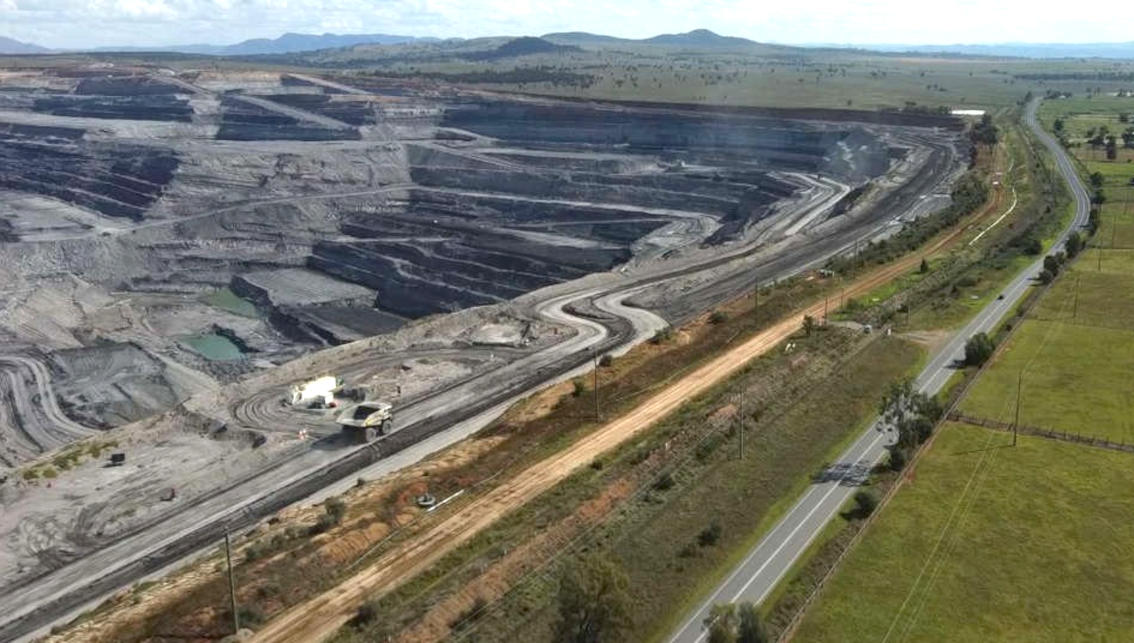
DINOSAUR -
As a leader, lacking any sort of crystal ball aiming for a
circular economy, Prime Minister Scott Morrison may be seen as a
fossil
fool, like the fuel he is so in love with, he even took a lump
of it into parliament, where like GoldMember,
he is in love with the feel and texture - and the smell as it
burns. As a fossil senile, his geriatric policies condemn his fellow Australians to
remain with old tech, refusing to embrace renewables and a
bright new future. He also condemns a significant number to agonizing
premature deaths in nursing, homes and hospitals. Buy hey, the
'Aussie Undertaker' is not concerned with funerals, through his
eyes choking people into an early grave tends to balance out the
rising population. Perhaps that is why he is pushing for more
coal exports and power stations. That would explain why the kangaroo
state's EV and infrastructure policies are non-existent. What a
wallaby!
SKY NEWS 8 NOVEMBER 2021
- "We're not closing the mines": Australia will continue selling coal
"for decades into the future"
Australia has said it expects to continue selling coal "decades into the future".
The country is the world's second largest exporter of thermal coal, which is used in coal-fired power stations.
Last week, it failed to add its name to a list of more than 40 countries pledging to phase out coal use within decades during the
COP26 UN climate summit in Glasgow.
Australian resources minister, Keith Pitt, on Monday reiterated the government's position that it won't be walking away from the fossil fuel.
"We've said very clearly, we are not closing coal mines and we're not closing coal fired power stations," he told Australian national broadcaster,
ABC.
Mr Pitt defended the stance due to increasing prices and demand, saying: "If we aren't filling that market somebody else will.
"We need to stick to the facts, Australia produces 4% of the world's thermal coal. It's some of the world's highest quality and that's why we'll continue to have markets decades into the future. And if they're buying...then we're selling," he said.
Australia unveiled a 2050 net zero emissions target in October but the plan has been criticised for lacking detail.
Mr Pitt rejected claims the country wasn't genuine about the 2050 target.
He said Australia has made its commitments, which would be met partly by investment in new technologies, but added it wouldn't "destroy the economy" 20 to 30 years before those commitments were due.
He said roughly 300,000 Australian's rely on the coal sector and demand for the fuel was expected to rise until around 2030.
"I'd much rather it be Australia's high quality product, delivering Australian jobs and building Australia's economy, rather than Indonesia, Russia or elsewhere," he added.
One climate analyst labelled the views "embarrassing" and an
"assault" on the spirit and intent of COP26.
"The comments by Australia's resources minister should send a shudder down the spine of governments around the world that are looking to take decisive action on climate change," Richie Merzian, climate and energy director at independent think-tank, the Australia Institute, told
Sky News from the Glasgow conference.
"Australia simply cannot be trusted as a reliable partner when it comes to global co-operation to tackle the climate crisis."
The country is expected to face growing pressure this week to increase its 2030 emissions target which was set six years ago.
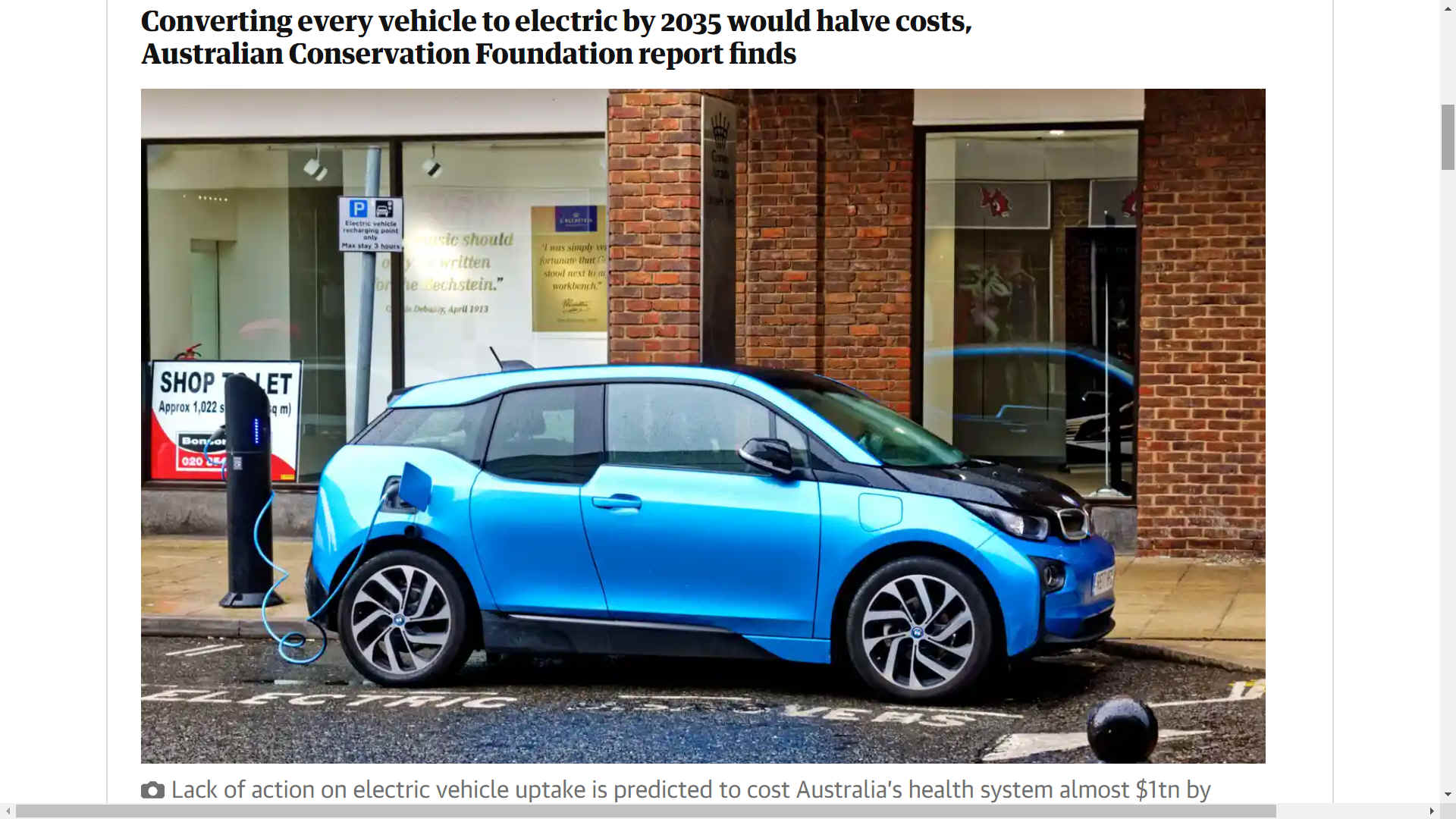
A
SLOW DEATH - If Australia had invested in electric vehicle
infrastructure, thousands of human lives could have been saved -
according to a report by the Australian Conservation Foundation.
To know about a potential cure, and to do nothing to implement
it, is a violation of the State's duty of care to their population.
Where everyone has the right to life, and to expect a long and
healthy life, this dereliction of duty constitutes a serious
human rights violation, multiplied by 5,000 every year in
Australia, and some 8 million deaths globally in 2018. It is
worse than Covid19 at 5,078,234 so far in two years. Hence,
petrol and diesel fumes are far more dangerous - but the problem
is not receiving the attention it deserves, because Scott
Morrison is "Zerophobic."
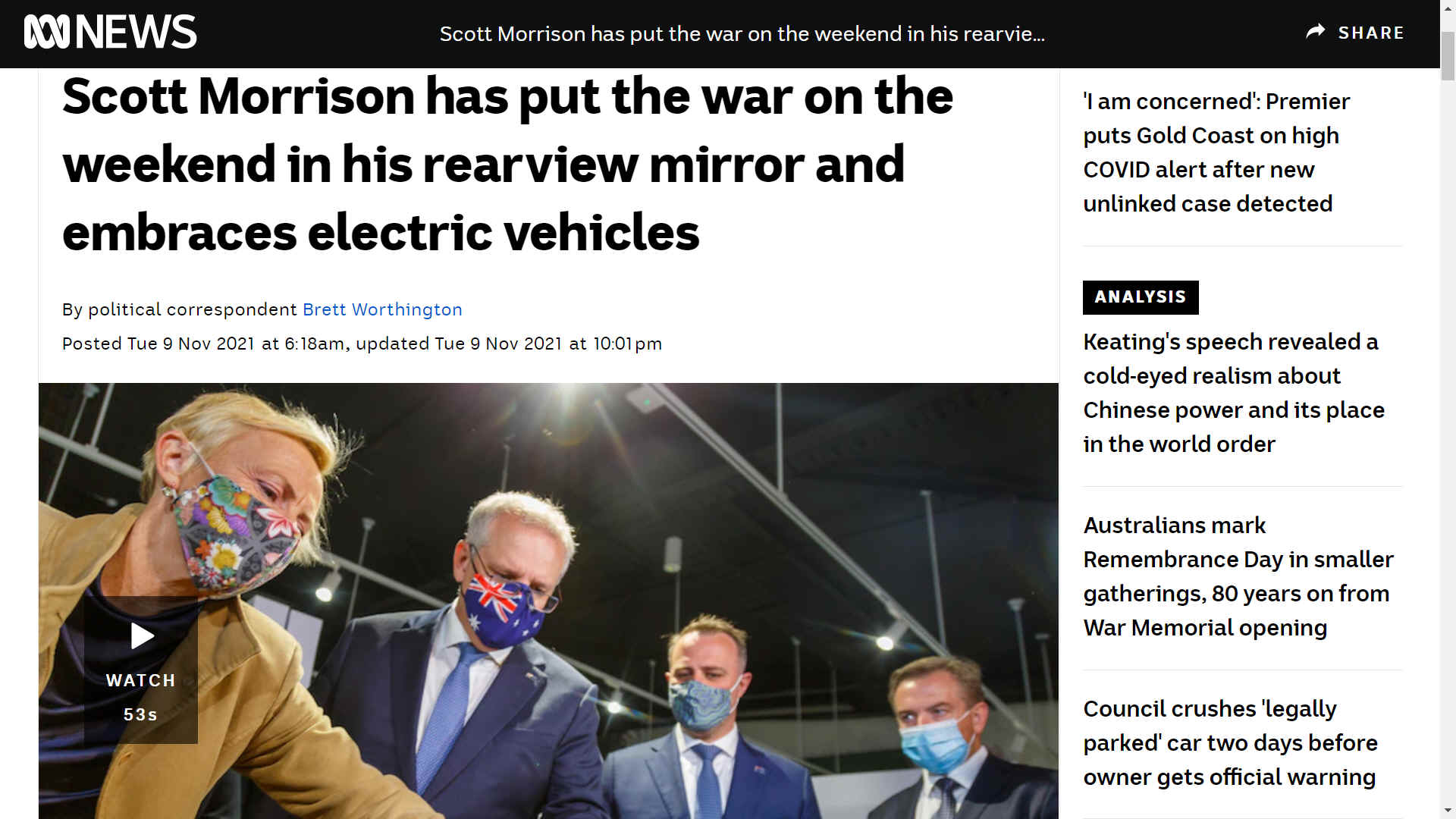
U
TURN FOR RE-ELECTION - So here stood Morrison in Melbourne, 2021, in a state that some in the Coalition dub as enemy territory, offering a full-throated endorsement of EVs.
This isn't a climate conversion for Morrison but rather an awakening to public sentiment that could threaten the political careers of urban Liberal MPs and ultimately his time as PM.
It's not unusual for backbenchers to introduce the Prime Minister when he visits electorates.
But in this case, Allen was a long way from home — literally standing on the opposite side of Melbourne to those constituents she was talking about.
The PM's trip to Melbourne was complete with enough photo opportunities that you could be forgiven for thinking the election campaign was already under way.
Morrison insists he was never against electric vehicles.
When asked if he regretted comparing electric vehicles to weekend destroying, Morrison said he was "against Bill Shorten's mandate policy, trying to tell people what to do with their lives, what cars they were supposed to drive and where they could drive".
The suggestion that there was a mandate or that people would be forced to buy or drive certain cars is a misrepresentation of Labor's 2019 policy.
The Coalition's 2021 EV policy is to boost the number of charging stations across the country.
But the government won't be seeking to reduce the prices of EVs, something Labor has pledged by making these cars exempt from certain tariffs and taxes.
THE
GUARDIAN - 23 OCTOBER 2021 - Poor EV take-up to cost Australia’s health system $1tn by 2050, modelling shows
Converting every vehicle to electric by 2035 would halve costs, Australian Conservation Foundation report finds.
Australia may be left with almost a $1tn health bill by 2050 if it doesn’t boost the take-up of electric vehicles, according to a new report released on Sunday.
But this could be slashed in half by setting an ambitious target to convert every car in the country to electric by 2035.
The modelling was released by the Australian Conservation Foundation (ACF), which commissioned accounting firm Deloitte to examine the community benefit from increasing the uptake of electric vehicles (EVs).
A “bespoke economic model” was used to examine three scenarios: whereby Australia achieved net-zero road transport emissions in 2035, 2040 and 2050. These scenarios compared the cost of air, noise, water and
greenhouse gas pollution caused by petrol- and diesel-powered cars, and those of EVs.
Petrol cars contribute heavily to air, noise and
water pollution through the particles emitted from the exhaust and through the waste grease,
oil and rubber needed to run them. By contrast,
electric vehicles have fewer components and more efficient motors.
As this pollution leads to illness, the cost ends up being borne by the health system.
The report found that under the “business as usual” scenario – where nothing is done to support uptake – costs will mount to $864.9bn by 2050, with air pollution alone amounting to $488.2bn.
New South Wales and Victoria will bear the brunt as the most populous states, with costs mounting to $257.7bn and $203.6bn respectively. On a per-capita basis, the combined use of private transport and freight was greatest in Western Australia, where the cost was $43,900 per person.
However, in a scenario where EVs made up 26% of the private car fleet by 2030 and 100% by 2050, Australia would avoid $233bn in costs. A more ambitious scenario where a 28% share is achieved by 2030 and full uptake in 2045 would see $335bn in costs side-stepped.
A rapid transition of the entire private car fleet to EV by 2035, when coupled with better public transport systems, would see $492bn in costs avoided.
Dr Eamon McGinn, a partner at Deloitte Access Economics, said while these figures were broadly understood among government departments, they are “not front of mind” for many people.
“We create invisible, unborne costs whenever we go driving. Obviously we pay for fuel and the maintenance, but there are these additional costs we impose on our neighbours and our community,” McGinn said.
“We think about petrol costs, we think about getting stuck in traffic. We don’t necessarily think about the noise, or the pollution coming out the tailpipe or the damage to waterways.”
Matt Rose, ACF’s economy and democracy program manager, said the report was unique in that it sought to measure the cost of inaction.
“Transport emissions are the second-largest source of emissions in
Australia and they’re growing,” Rose said. “There is a cost to not moving and this shows what those costs are in our built-up city areas.”
The report assumed that all EVs would be powered entirely by renewable energy and obtained its data from the Bureau of Infrastructure and
Transport Research Economics, and Australian Transport Assessment and Planning guidelines.
The honorary secretary of Doctors for the Environment, Dr Richard Yin, said independent research suggested the combined pollution from coal-fired power and
internal combustion engines caused 5,000 deaths a year, with some studies finding the cost to the health system running as high as $24bn a year.
“It’s a ginormous hidden cost,” Yin said. “Worldwide for example, there were 8 millions deaths globally in 2018. That’s a year.”
While the goal should be for all electric vehicles to be entirely powered by
renewable energy, Yin said there were still benefits even where the power was drawn from coal.
“There are advantages even if you are sourcing power from coal-fired power stations because the vehicles are more efficient,” he said. “The benefits are just multiplied when we transition to renewable energy and get rid of coal-fired power stations as well.”
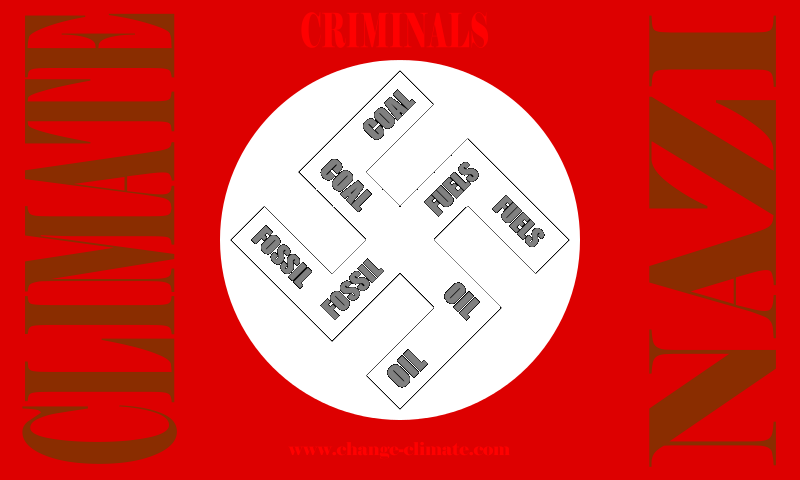
RIP
- Here lays Scott Morrison, climate criminal, remembered for
his love of coal and policy prohibitions on EVs.
THE
DIRTIEST DOZEN - ALL IS FAIR IN LOVE & WAR
|
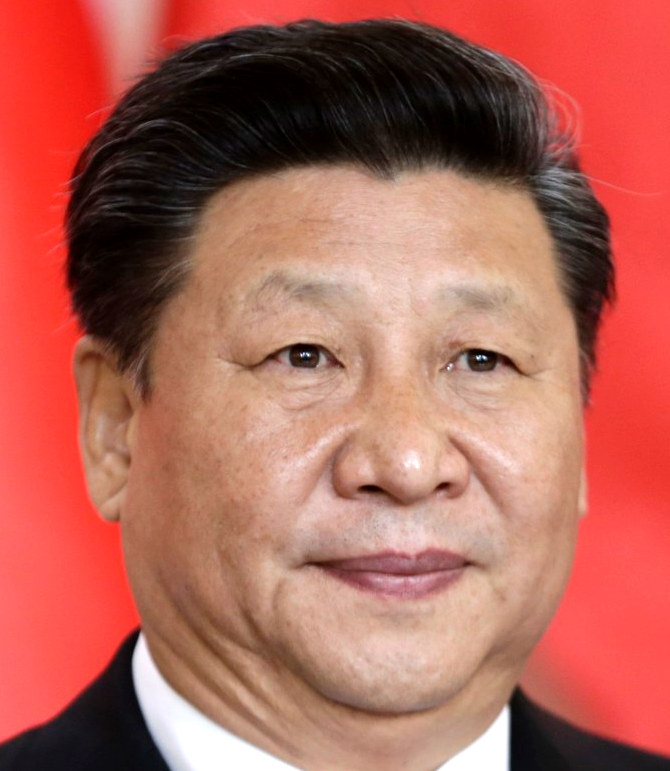
Chinese
President
Xi
Jinping
|
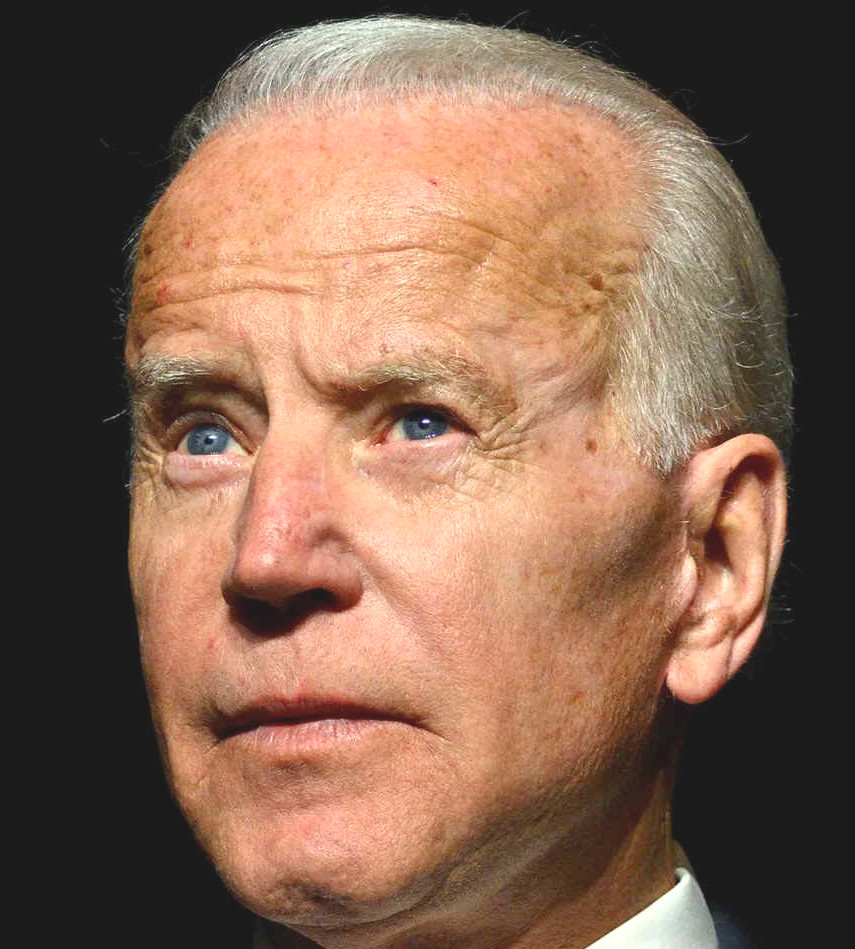
US
President
Joe
Biden
|

EU
President
Ursula
von der Leyen
|
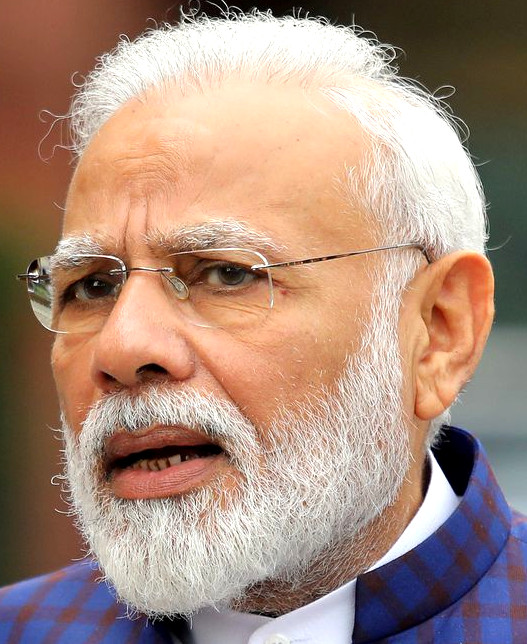
Indian
PM
Narendra
Modi
|
|
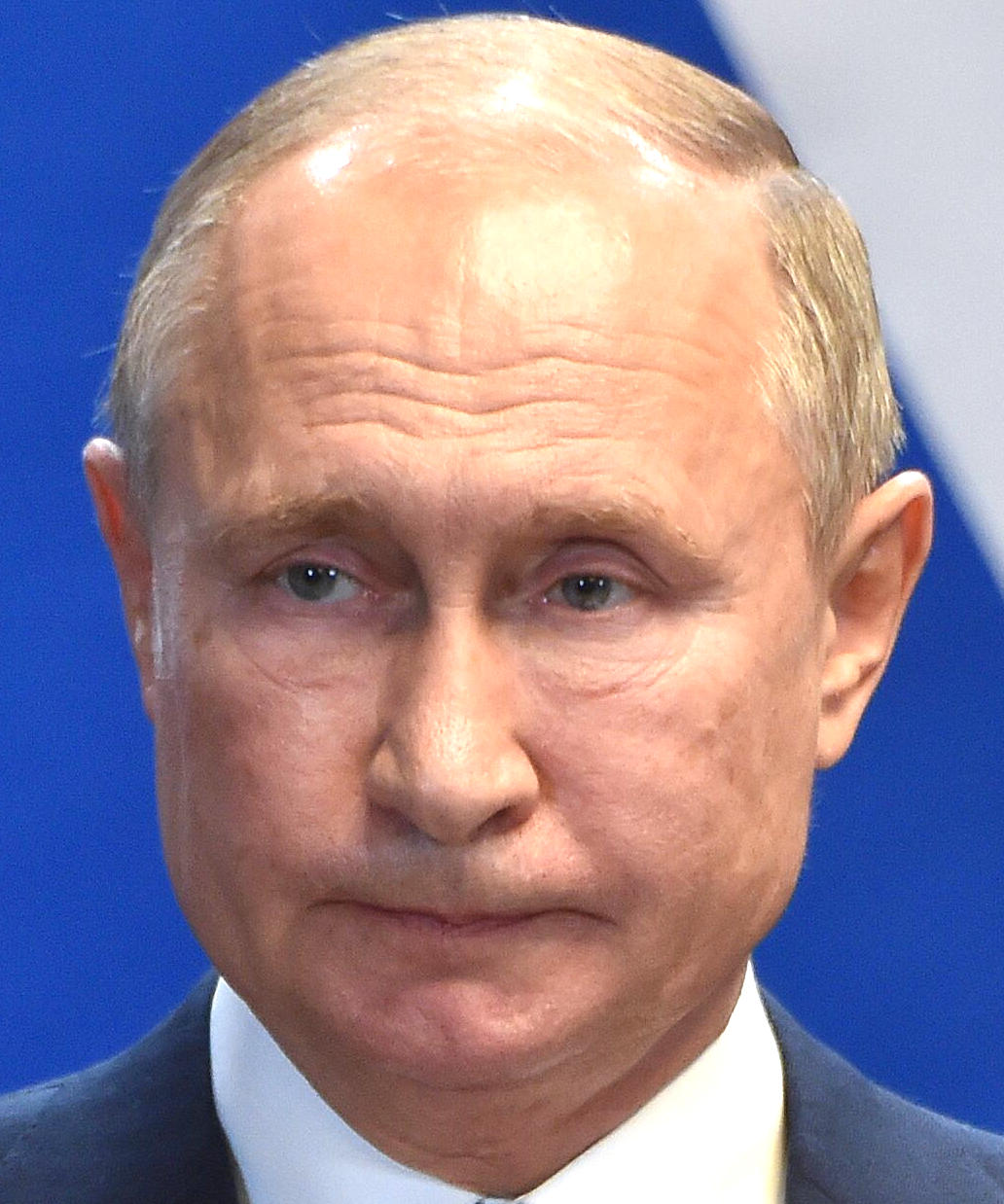
Vladimir
Putin
Russian
PM
|
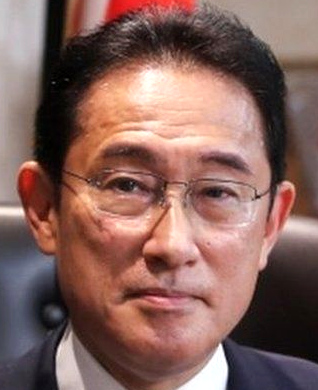
Japanese
PM
Fumio Kishida
|
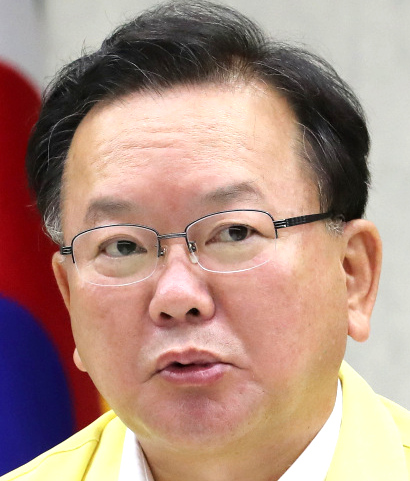
Kim
Boo-kuym
South
Korean PM
|

Mohammed bin Salman
Saudi
Arabian Ruler
|
|
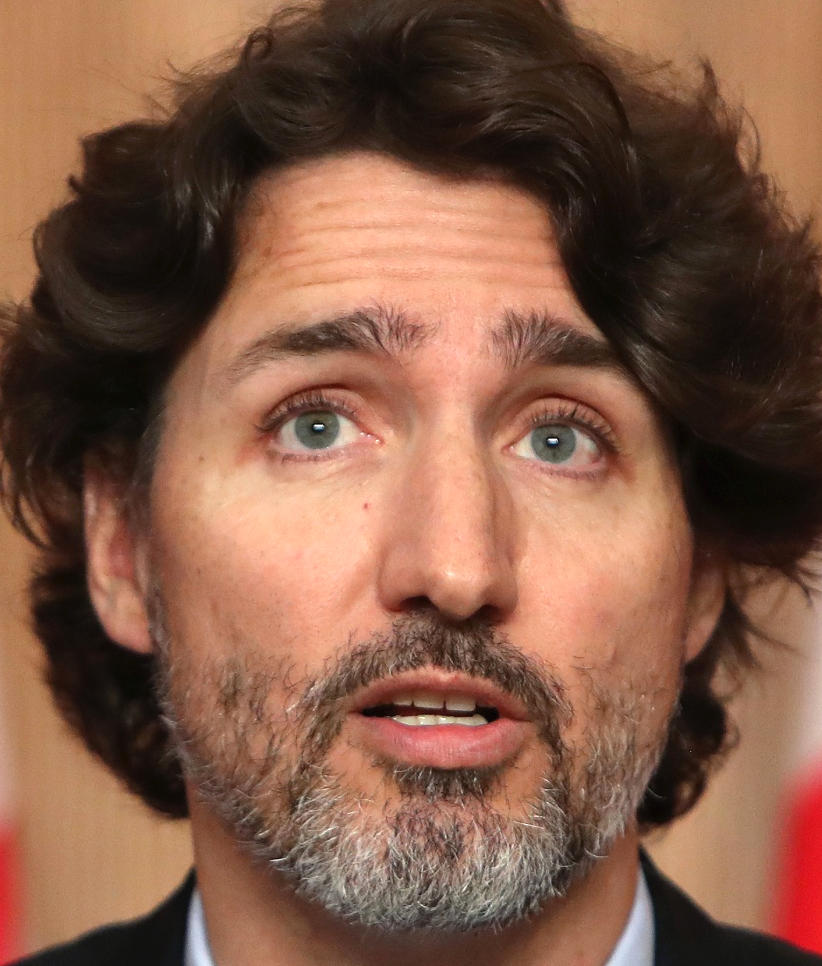
Justin
Trudeau
Canadian
PM
|
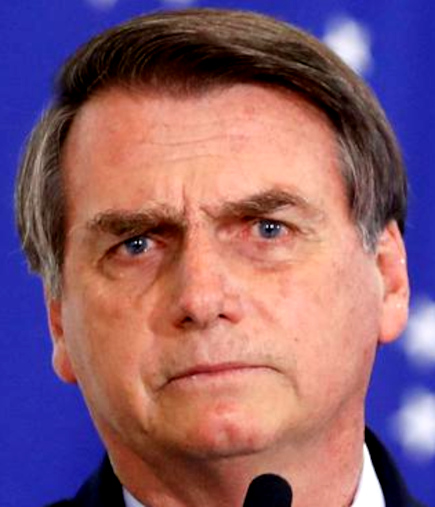
Jair Bolsonaro
Brazilian
PM
|
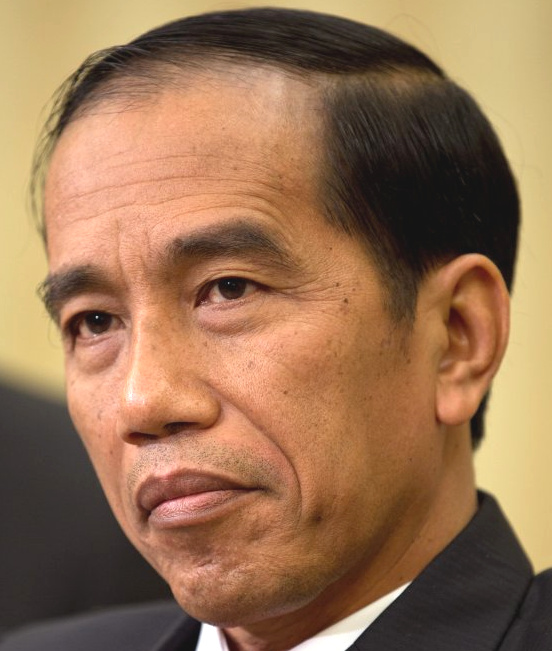
Joko Widodo
Indonesian
PM
|
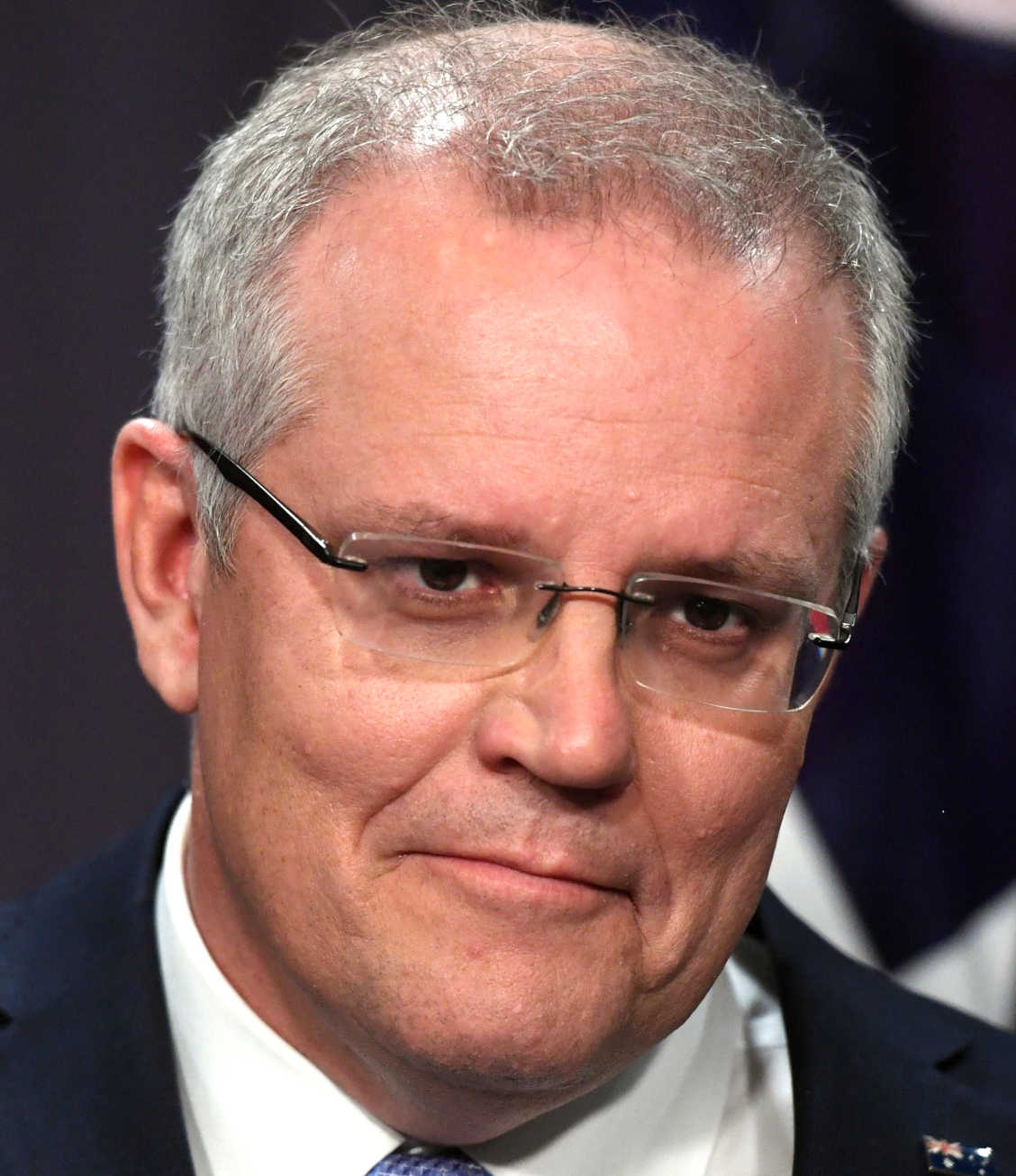
Scott
Morrison
Australian
PM
|
G20
abusers will say they had no choice. They needed to keep
burning coal, gas
and oil for their economies - just like the camp guards at the
many concentration camps, they were forced into business as
usual. In the case of the camp guards, they argued they were
just following orders. But that is not true. We all have
choices. There are clean alternatives, such as solar
and wind
power. There is no need to keep building coal
fired electricity
generating stations, and no need to drive carcinogenic petrol
or diesel vehicles that contribute
to lung
cancer. We have hydrogen
fuel
cells, electrolyzers
and zero
emission electric
vehicles.
If
you are going to increase electricity capacity, it makes sense
to invest in renewable
energy, unless it is that the fossil
fuel giants are lubricating the works with party donations.
If that is the case, we say that such contributions should be
transparently declared, that the public is informed as to what
is guiding policy decisions.
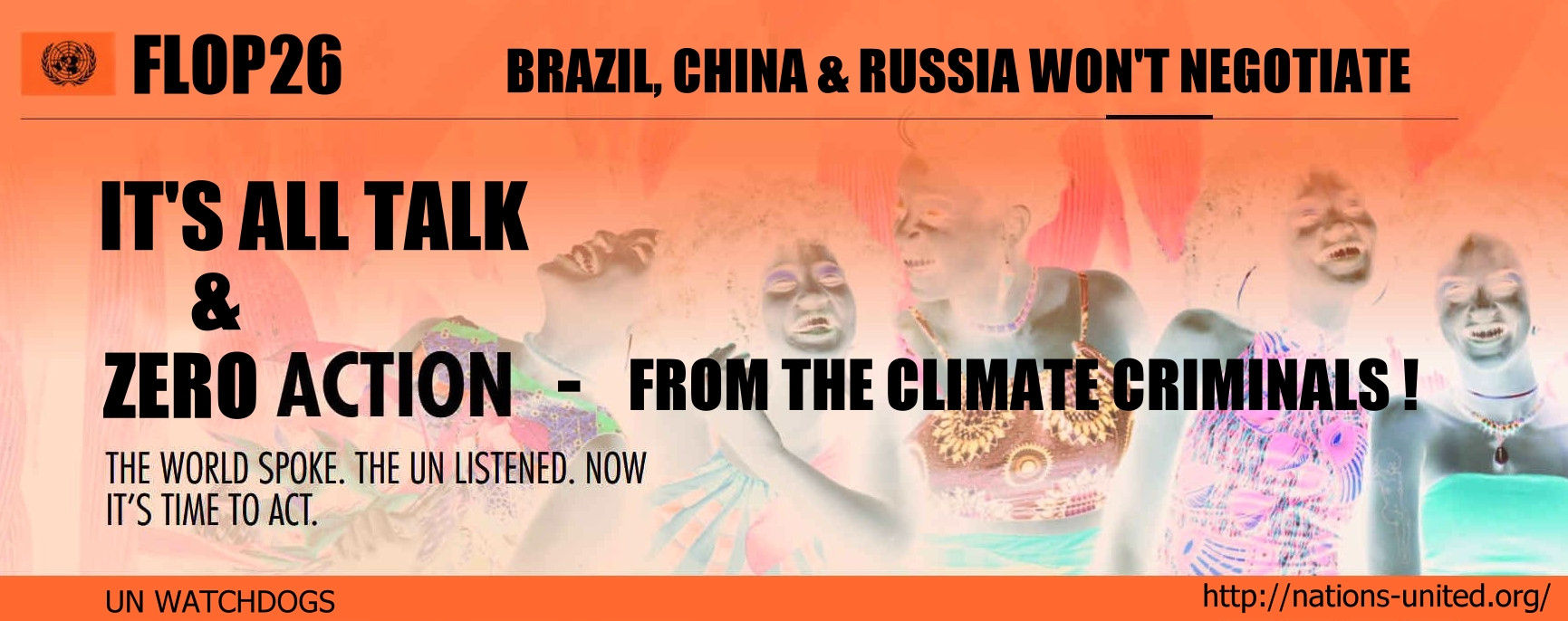
Benjamin
Sporton
Charles
Koch
Darren
Woods
Fiona
Wild
Marc Morano
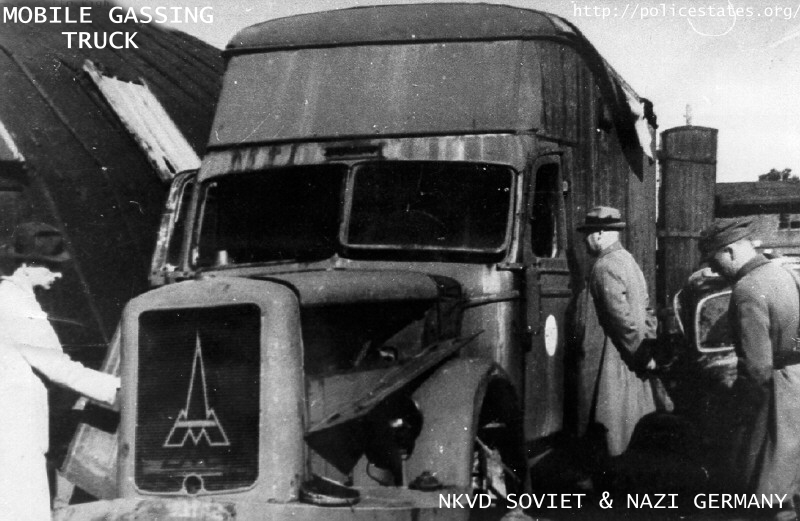
MOBILE
GAS CHAMBERS - The oil barons know about cancer victims dying of
lung cancer
and heart disease
from carcinogenic and particulate vehicle exhausts, as they reap export
dollars in return. During the Second World
War, concentration
camp guards used petrol and diesel truck exhausts to gas
prisoners, before Zyklon
B.
The Nazis began experimenting with poison gas for the purpose of mass murder in late 1939 with the killing of mental patients (“euthanasia”). A Nazi euphemism, “euthanasia” referred to the systematic killing of those
Germans whom the Nazis deemed “unworthy of life” because of mental illness or physical disability
One of several methods used was the gas van. Such vans were first deployed in 1940 in “Euthanasia” operations. Hitler delegated the “Euthanasia” operation to Reichsleiter
Philip Bouhler, Dr. Karl Brandt, and several doctors of their choice. The targets were several German population groups: the mentally ill or retarded, the chronically ill, and criminals. At first, the murders were carried out in fixed, sealed chambers, into which
carbon monoxide gas was pumped from metal canisters. In addition, some were killed by lethal injections and by shooting. Gas vans were first used in 1940, when Polish mentally ill children were locked in a sealed van and killed by carbon
monoxide poisoning.
The gas van was invented and used by the Soviet secret police NKVD in the late 1930s during the Great Purge. It was later widely implemented as
an extermination method in Nazi Germany to kill those the regime deemed enemies of the Third Reich, mostly Jews.
INVENTION AND USE IN THE SOVIET UNION - The gas van was invented in the
Soviet Union
in 1936, by Isay Berg, the head of the administrative and economic department of the NKVD of Moscow Oblast which suffocated batches of prisoners with engine fumes in a camouflaged bread van while on the drive out to the mass graves at
Butovo, where the prisoners were subsequently
buried. According to Aleksandr Solzhenitsyn, “I. D. Berg was ordered to carry out the decisions of the NKVD troika of Moscow Oblast, and Berg
was carrying out this assignment: he was driving people to the executions by shooting. But, when in Moscow Oblast, there came to be three troikas having their sessions simultaneously, the executioners could not cope with the load. They hit upon a solution: to strip the victims naked, to tie them up, plug their mouths and throw them into a closed truck, disguised from the outside as a bread van. During transportation the fuel gases came into the truck, and when delivered to the farthest [execution] ditch the arrestees were already dead.” Berg denied
being the inventor of the mobile gassing van.
COAL
& OIL COMPANIES - In seeking to extend the use of
fossil fuels, the world's oil, gas and coal companies, and the
nations that continue to develop coal generation for so-called
cheap energy, are turning the whole planet into one giant carcinogenic
gas chamber.

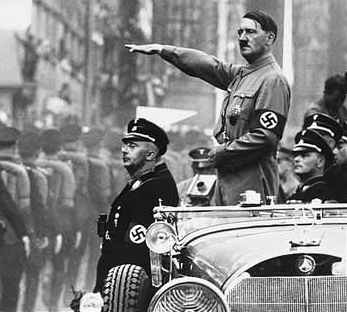
Adolf
Hitler and chum Heinrich Himmler
mastermined the agendas of Nazi Germany.
Allegedly,
Adolf Hitler did not die in that bunker incident C.1949.
Apparently, he was fired into England, strapped to a V1 rocket, leaving
behind his false teeth. He parachuted into the Wealden District that night
hoping to meet some deviants, who'd arranged a new identity for their
fallen comrade. Apparently, he landed in Crowborough, shaved off
his moustache and was mistaken for a Wealden council official, whereupon he
infiltrated the ranks of the local authority and trained them how to use his
terror tactics to control the peasant civilians.
LINKS
& REFERENCE
|

Adolf
Hitler
German
Chancellor
|
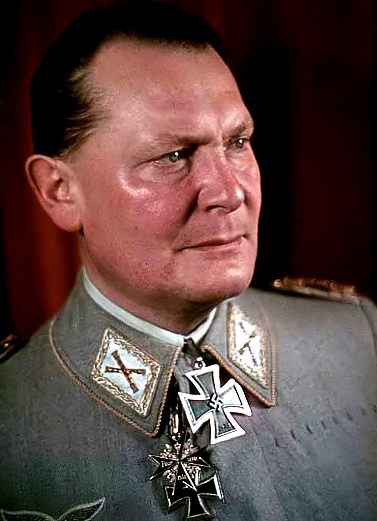
Herman
Goring
Reichsmarschall
Luftwaffe
|

Heinrich
Himmler
Reichsführer Schutzstaffel
|

Joseph
Goebbels
Reich Minister Propaganda
|
|
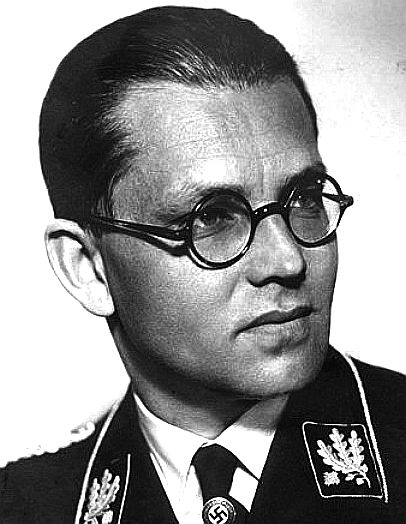
Philipp
Bouhler SS
NSDAP
Aktion T4
|

Dr
Josef Mengele
Physician
Auschwitz
|
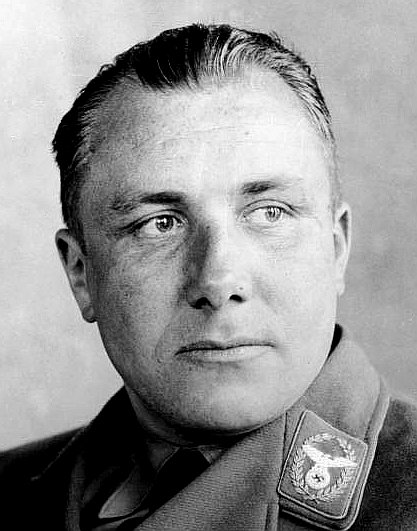
Martin
Borman
Schutzstaffel
|

Adolph
Eichmann
Holocaust
Architect
|
|
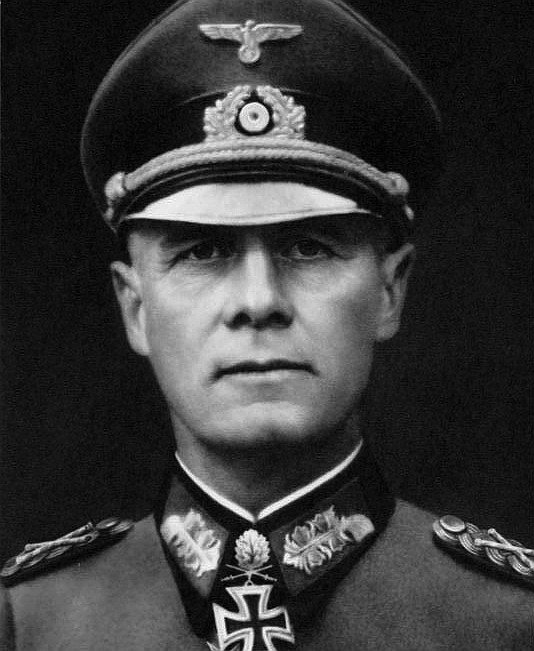
Erwin
Rommel
The
Desert Fox
|
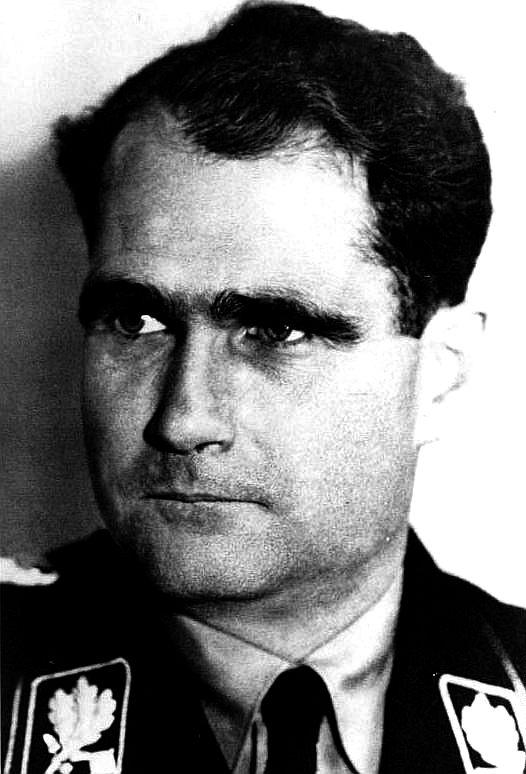
Rudolf
Hess
Auschwitz
Commandant
|
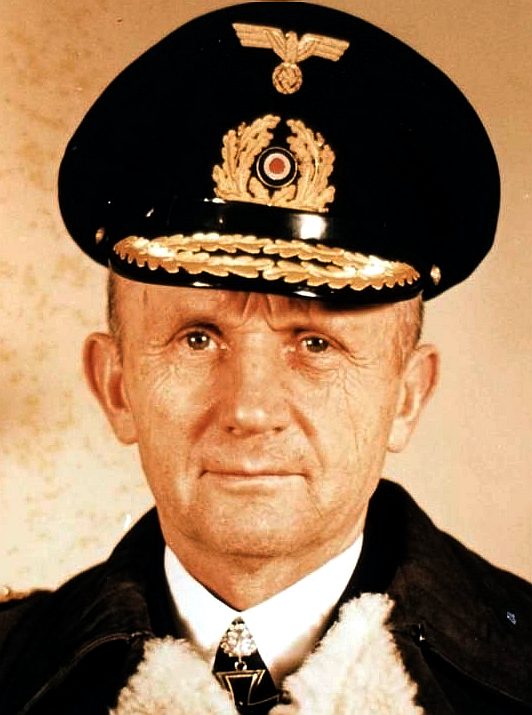
Karl
Donitz
Submarine
Commander
|

Albert
Speer
Nazi
Architect
|

Nazi
death camp executions
A
Nazi war criminal
is a person who kills an unarmed human being or
gives the order to kill another human being outside the normal
rules of engagement in times of war.
In peacetime, a
Climate Change Criminal, is a politician,
industrialist or other entity that conducts
themselves and/or their policies such as to (in effect) murder
another human being from starvation or poisoning resulting from
action or inaction on their part, including dumping plastic in
the sea.
This
philosophy extends to causing hardship and stress, contrary to
Articles 2 and 3 of the EU's Human Rights Convention and Articles
3 and 5
of the Universal Declaration of Human
Rights.

LINKS
& REFERENCE
https://www.skynews.com.au/australia-news/australia-withholds-signature-from-cop26-pledge-to-phase-out-coal-by-2030s/news-story/4abef8f0ef59a1ee91a44c30505506d2
https://www.theguardian.com/australia-news/commentisfree/2021/nov/09/scott-morrison-wants-to-be-australias-prime-marketer-but-voters-arent-buying-his-woeful-climate-rebrand
https://www.theguardian.com/environment/2021/oct/24/poor-ev-take-up-to-cost-australias-health-system-1tn-by-2050-modelling-shows
https://reneweconomy.com.au/scott-morrisons-hopeless-spin-and-failure-on-electric-vehicles/
https://www.abc.net.au/news/2021-11-09/war-on-weekend-electric-vehicles-climate-change-targets/100604902
https://www.abc.net.au/news/science/2021-04-20/australians-want-to-buy-electric-cars-what-is-stopping-us/100071550
https://www.abc.net.au/news/2021-11-09/war-on-weekend-electric-vehicles-climate-change-targets/100604902
https://www.abc.net.au/news/science/2021-04-20/australians-want-to-buy-electric-cars-what-is-stopping-us/100071550
https://reneweconomy.com.au/scott-morrisons-hopeless-spin-and-failure-on-electric-vehicles/
https://www.theguardian.com/environment/2021/oct/24/poor-ev-take-up-to-cost-australias-health-system-1tn-by-2050-modelling-shows
https://www.theguardian.com/australia-news/commentisfree/2021/nov/09/scott-morrison-wants-to-be-australias-prime-marketer-but-voters-arent-buying-his-woeful-climate-rebrand
https://www.skynews.com.au/australia-news/australia-withholds-signature-from-cop26-pledge-to-phase-out-coal-by-2030s/news-story/4abef8f0ef59a1ee91a44c30505506d2
|









































